from MOH report 6 August 2021:
The Multi-Ministry Taskforce had earlier announced the reversion to Phase 2 (Heightened Alert) from 22 July 2021 through 18 August 2021 to allow us to contain the outbreak of clusters in the community and minimise the risk of our healthcare capacity being overwhelmed while we ramped up our vaccination rates, particularly among seniors. Through the cooperation and efforts of everyone, the situation has stabilised. Infection numbers are stable and more importantly, the number of individuals with severe illnesses and deaths did not rise uncontrollably.
Preparing to be a COVID-19 Resilient Nation
2. During this period, our population vaccination rate has been going up by about one percentage-point each day. As of 5 August 2021, 67% of the population have completed their full vaccination regimen under the national vaccination programme and 78% have received at least one dose. Vaccination reduces the risk of infection and serious disease when infected with COVID-19. Over the last 28 days, among the 80 local cases infected with COVID-19 who are seriously ill [1], 72 are unvaccinated or partially vaccinated, while only 8 are fully vaccinated. A highly vaccinated resident population is crucial to our safe reopening and transition towards an endemic COVID-19 world.
3. We remain concerned that unvaccinated seniors may suffer severe illness if infected. Hence, we have ramped up efforts to encourage more seniors to be vaccinated. Seniors can walk into any vaccination centre, polyclinic, or Public Health Preparedness Clinic for their vaccinations. We have also deployed mobile vaccination teams to locations where many seniors live and home vaccination teams for homebound individuals. In addition, we have roped in General Practitioners and Traditional Chinese Medicine practitioners to persuade seniors to be vaccinated. Many of our seniors have responded to these initiatives. We are also asking polyclinics and public hospitals to bring forward the appointments of seniors who are contraindicated, so that they can receive earlier advice on whether they can receive COVID-19 vaccinations. Currently, 76% of those aged 70 and above have completed two doses and 82% have received at least one dose. But there are still about 80,000 in this group that have yet to be vaccinated. As this group is at higher risk of being infected and being seriously ill if infected, we will continue efforts to help them get their vaccinations.
4. By 9 August 2021, we expect that around 70% of our entire population would have completed two doses. This gives us some confidence that we can start to re-open our economy and resume more activities. However, we will continue to take a calibrated risk-based approach in re-opening. We will monitor health outcomes, particularly hospitalisation and ICU cases, to avoid exponential increases that could overwhelm our healthcare capacity.
5. In particular, we will adopt a vaccination-differentiated approach when adjusting our safe management and border measures. Fully vaccinated individuals, who have good protection against the risk of infection or severe illnesses, will be able to engage in a wider range of activities. Unvaccinated individuals will need to exercise tighter safe management measures to protect themselves and those around them.
6. Even with high vaccination coverage, we may still have vaccine breakthroughs and a large number of daily COVID-19 cases within the community. Nevertheless, with the majority of our population protected through vaccination, we should be able to keep hospitalisation and ICU cases low. We will continue to monitor the situation, especially the incidence of severe illness from COVID-19, as we continue with our re-opening plans.
Updates in Healthcare Protocols.
7. As we prepare for the transition towards COVID resilience, we have reviewed our medical management protocols for our COVID-19 patients. With evidence emerging that vaccinated individuals can recover within 10 days from illness onset, we have moved to discharge fully vaccinated persons earlier at Day 10 from isolation if their PCR test shows that they are COVID-19 negative or have very low viral loads. Others who do not meet the criteria will continue to be discharged after 14 days of isolation without any further testing, with an additional 7 days’ leave of absence. This approach gives us assurance that cases will not pose transmission risks to their family and community upon discharge.
Updates to Safe Management Measures from 10 August 2021
8. We have also undertaken a mid-point review of the Phase 2 (Heightened Alert) measures, and will allow some easing of the measures in two steps. The first will take effect from 10 August 2021, and the second from 19 August 2021, if conditions remain stable. Please refer to Annex A for details.
(A) Increase in Social Gathering Group Size
9. We will increase the current social gathering group size limit from 2 persons to 5 persons and increase the cap of 2 distinct visitors per household per day to 5 distinct visitors per household per day. Unvaccinated individuals should remain in groups of no more than 2 persons, to reduce the likelihood of transmission and severe infection. We should also continue to limit our social circle to a small group of regular contacts and limit the number of social gatherings to no more than two a day.
(B) Updates on Vaccination-Differentiated Safe Management Measures and Eligibility
10. With better protection against infection and severe illness, fully-vaccinated individuals may participate, in groups of up to 5 persons, in higher-risk activities where masks are removed, e.g. Food & Beverage (F&B) dine-in, personal care services, indoor high-intensity mask-off sports; and in larger events e.g. solemnizations, congregational and other worship services.
11. With higher vaccination coverage under our national vaccination programme, we can take a more inclusive approach in recognising COVID-19 vaccines in the World Health Organisation’s Emergency Use Listing (WHO EUL). From 10 August 2021, individuals who are fully vaccinated with the WHO EUL vaccines such as Sinovac-CoronaVac, Sinopharm, and AstraZeneca will be eligible for the vaccination-differentiated safe management measures.Thus, an individual will be considered “fully-vaccinated” two weeks after he or she has received the full regimen of Pfizer-BioNTech/ Comirnaty, Moderna, or any WHO EUL vaccines.
12. Unvaccinated individuals with a valid negative pre-event test result or recovered individuals are of similarly lower risk, and may also join in such groups of up to 5.
Resumption of Dining-in at F&B Establishments for Vaccinated Groups
13. Groups of up to 5 persons will be allowed to dine-in at F&B establishments if all the diners are fully vaccinated. Unvaccinated children aged 12 years and below may be included within the group of 5 persons as long as all the children are from the same household.
14. Individual F&B establishments may only resume dine-in services for fully vaccinated persons as outlined above. F&B establishments that are not able to ensure this may only operate take-away and delivery services.
15. Hawker centres and coffee shops provide convenient and affordable food services within the community. As these are open-air and naturally ventilated spaces, we will extend a special concession for both vaccinated and unvaccinated persons to dine in the hawker centres and coffee shops. But this will be subject to a smaller group size of up to 2 persons only.
16. Dining-in at F&B establishments remains a high-risk activity because many people will be unmasked and in close proximity with each other. At this stage of the transition, entertainment such as live performances, recorded music, and videos/TV screening will continue to be prohibited. Patrons to F&B establishments are also reminded to adhere to all safe management measures and keep their masks on at all times except when eating or drinking.
(C) Increase in Event Size and Capacity Limits
17. The following event sizes and capacity limits will be increased. The provision for children aged 12 years and below will also apply for these events. Unvaccinated children may be included in a group of up to 5 persons if all the children are from the same household.
a) Congregational and other worship services, cinemas, MICE, live performances, and spectator sport events. Event sizes may increase to 500 attendees if all are fully vaccinated. Otherwise, only up to 50 attendees will be allowed without pre-event testing (PET). Unmasking and singing or playing of wind instruments at live performances for vaccinated performers may resume, subject to updated safe management measures. Further details on live performances will be released by the National Arts Council (NAC). Further details on worship services will be released by the Ministry of Culture, Community and Youth (MCCY).
b) Marriage solemnizations and wedding receptions. Marriage solemnizations in external venues (i.e. not in a place of residence or in the Registry of Marriages/Registry of Muslim Marriages building) may take place with up to 500 persons (including the wedding couple but excluding solemnizers and vendors) if all are fully vaccinated. Otherwise, only up to 50 attendees will be allowed without PET. Wedding receptions will be allowed with up to 250 attendees if all are fully vaccinated, and with groups of up to 5 attendees per table.
Adjustments from 19 August 2021
18. If the COVID-19 situation remains under control, we will further increase event sizes and capacity limits for the following activities and settings from 19 August 2021:
a) Congregational and other worship services, cinemas, MICE, live performances, spectator sport events, and marriage solemnizations. These events may take place with up to 1,000 attendees if all are fully vaccinated. Otherwise, only up to 50 attendees will be allowed without PET.
b) Attractions, cruises, museums, and public libraries. The operating capacity of attractions and cruises will be increased from the current capacity of 25% to 50%. Museums and public libraries will also be allowed to operate at an increased operating capacity of 50%.
c) Shopping malls and showrooms. The occupancy limits for shopping malls and showrooms will be increased from the current limit of 16 sqm per person of Gross Floor Area, to 10 sqm per person.
19. Work-from-home. We will also ease the work-from-home requirements. In particular up to 50% of employees who are able to work from home will be allowed to return to the workplace.
Removal of Temperature Screening Requirement
20. With high levels of vaccine coverage among our population, transmission among vaccinated individuals and disease severity in vaccinated but infected persons are likely to be substantially lower. In addition, we now have the ability to pick up infections earlier through increased surveillance measures including self-test antigen rapid test (ART) kits and rostered routine testing with fast and easy tests (FETs) in higher risk settings. With these other targeted public health tools, we will remove the requirement for temperature screening in public premises, together with the other relaxation of measures planned from 19 August 2021 onwards. Nevertheless, it is important to continue exercising good health-seeking behaviour when one is unwell by seeking care as soon as possible, using a mask and avoiding crowded places.
Transition towards COVID-19 Resilience
21. Looking ahead, when at least 80% of our population have received their full vaccination regimens, we will be able to take the next steps towards opening up our economy, social activities, and travel. At that stage, we can consider further easing of restrictions, while continuing with differentiated safe distancing rules for vaccinated and unvaccinated persons. We will make these moves in a controlled manner, synchronising the easing with our vaccination coverage, and seeking to minimise the incidence of severe illness and death.
“Vaccinate or Regular Test” Regime for Selected Sectors of the Workforce
22. Although Singapore’s vaccination rates are one of the highest in the world, we need to continue to expand our vaccine coverage. Hence we will require vaccination, or regular testing in lieu, for selected sectors of the workforce. Unvaccinated persons will be required to undergo regular testing to pick up possible infections early so that they can be treated early. This will also mitigate risk of transmission to their colleagues and the public.
23. This “vaccinate or regular test” regime will be introduced in the following settings:
a) First for those working in the healthcare sector, eldercare sector and settings with children 12 years and below. This protects vulnerable segments of the population such as the elderly, children and sick.
b) Second, for individuals working in sectors that interact with customers in higher-risk mask-off settings, and at our borders or COVID-19 frontline work. These sectors include F&B establishments, gyms and fitness studios, and personal care services.
c) Finally, the Public Service will take the lead in introducing this requirement for public officers, including the uniformed services.
24. We will give some time for individuals to get vaccinated, thus the requirement will take effect from 1 October 2021. Beyond that, any unvaccinated persons from the above sectors will have to be tested with an ART kit twice a week. For the small group that remains medically ineligible for vaccines, the Government will subsidise their tests.
25. More details will be released by the respective Ministries overseeing the sectors. We strongly encourage all employers to facilitate vaccination for your employees. A fully vaccinated workforce ensures a safe workplace and safe environment for everyone. We will continue to closely monitor our vaccination rates and review the need to include other sectors in the future.
Vaccination-Differentiated Border Measures
26. As we have reached higher vaccination rates locally, we will progressively review some of our border restrictions to facilitate more travel and introduce vaccination-differentiated border measures for travellers from countries/regions that have shown an ability to control the pandemic and vaccinate large parts of their population.
Resuming Entry Approvals for Vaccinated Work Pass Holders and Their Dependants
27. From 10 August 2021, the Ministry of Manpower will resume entry approvals for work pass holders and their dependants with travel history to higher risk countries/ regions. Eligible work pass holders and their dependants must be fully vaccinated2 before arrival in Singapore. They will also be subjected to the prevailing health protocols in Singapore.
Option for 14-day Stay Home Notice (SHN) at Suitable Place of Residence/ Accommodation of Choice
28. From 20 August 2021, 2359 hrs, all fully vaccinated travellers [2] from Australia, Austria, Canada, Germany, Italy, Norway, the Republic of Korea (ROK), and Switzerland [3] may be able to apply to opt out of dedicated SHN facilities and serve their 14-day SHN at their respective places of residence (e.g. residential address) or other suitable accommodation if they fulfil certain criteria (See Annex B for details).
29. All other travellers from the aforementioned countries/regions must continue to serve the SHN in a dedicated SHN facility. As the list of countries will be updated from time to time depending on the public health risk assessment, all travellers are reminded to check the SafeTravel website for updates to the border measures. They will be subjected to these prevailing border measures upon entry, including stays in dedicated SHN facilities and payment, where applicable.
Towards a Resilient Singapore living with COVID-19
30. We have made significant progress in vaccinating the Singapore population. We must continue to push for higher vaccination coverage so that in time to come, we may be able to treat COVID-19 no differently from other diseases that are endemic to Singapore. It will then not dominate our lives but become part of our new normal. We may continue to see relatively high number of daily cases, but the majority of vaccinated individuals will recover, and we can focus on the smaller number of cases with severe illnesses or infections. We will continue to find means to manage any new or emerging variants, and review strategies such as vaccination boosters for the population. We thank Singaporeans for your cooperation in these efforts. We must continue to work together in this journey towards a COVID-19 resilient nation.
MINISTRY OF HEALTH
6 AUGUST 2021
The Multi-Ministry Taskforce had earlier announced the reversion to Phase 2 (Heightened Alert) from 22 July 2021 through 18 August 2021 to allow us to contain the outbreak of clusters in the community and minimise the risk of our healthcare capacity being overwhelmed while we ramped up our vaccination rates, particularly among seniors. Through the cooperation and efforts of everyone, the situation has stabilised. Infection numbers are stable and more importantly, the number of individuals with severe illnesses and deaths did not rise uncontrollably.
Preparing to be a COVID-19 Resilient Nation
2. During this period, our population vaccination rate has been going up by about one percentage-point each day. As of 5 August 2021, 67% of the population have completed their full vaccination regimen under the national vaccination programme and 78% have received at least one dose. Vaccination reduces the risk of infection and serious disease when infected with COVID-19. Over the last 28 days, among the 80 local cases infected with COVID-19 who are seriously ill [1], 72 are unvaccinated or partially vaccinated, while only 8 are fully vaccinated. A highly vaccinated resident population is crucial to our safe reopening and transition towards an endemic COVID-19 world.
3. We remain concerned that unvaccinated seniors may suffer severe illness if infected. Hence, we have ramped up efforts to encourage more seniors to be vaccinated. Seniors can walk into any vaccination centre, polyclinic, or Public Health Preparedness Clinic for their vaccinations. We have also deployed mobile vaccination teams to locations where many seniors live and home vaccination teams for homebound individuals. In addition, we have roped in General Practitioners and Traditional Chinese Medicine practitioners to persuade seniors to be vaccinated. Many of our seniors have responded to these initiatives. We are also asking polyclinics and public hospitals to bring forward the appointments of seniors who are contraindicated, so that they can receive earlier advice on whether they can receive COVID-19 vaccinations. Currently, 76% of those aged 70 and above have completed two doses and 82% have received at least one dose. But there are still about 80,000 in this group that have yet to be vaccinated. As this group is at higher risk of being infected and being seriously ill if infected, we will continue efforts to help them get their vaccinations.
4. By 9 August 2021, we expect that around 70% of our entire population would have completed two doses. This gives us some confidence that we can start to re-open our economy and resume more activities. However, we will continue to take a calibrated risk-based approach in re-opening. We will monitor health outcomes, particularly hospitalisation and ICU cases, to avoid exponential increases that could overwhelm our healthcare capacity.
5. In particular, we will adopt a vaccination-differentiated approach when adjusting our safe management and border measures. Fully vaccinated individuals, who have good protection against the risk of infection or severe illnesses, will be able to engage in a wider range of activities. Unvaccinated individuals will need to exercise tighter safe management measures to protect themselves and those around them.
6. Even with high vaccination coverage, we may still have vaccine breakthroughs and a large number of daily COVID-19 cases within the community. Nevertheless, with the majority of our population protected through vaccination, we should be able to keep hospitalisation and ICU cases low. We will continue to monitor the situation, especially the incidence of severe illness from COVID-19, as we continue with our re-opening plans.
Updates in Healthcare Protocols.
7. As we prepare for the transition towards COVID resilience, we have reviewed our medical management protocols for our COVID-19 patients. With evidence emerging that vaccinated individuals can recover within 10 days from illness onset, we have moved to discharge fully vaccinated persons earlier at Day 10 from isolation if their PCR test shows that they are COVID-19 negative or have very low viral loads. Others who do not meet the criteria will continue to be discharged after 14 days of isolation without any further testing, with an additional 7 days’ leave of absence. This approach gives us assurance that cases will not pose transmission risks to their family and community upon discharge.
Updates to Safe Management Measures from 10 August 2021
8. We have also undertaken a mid-point review of the Phase 2 (Heightened Alert) measures, and will allow some easing of the measures in two steps. The first will take effect from 10 August 2021, and the second from 19 August 2021, if conditions remain stable. Please refer to Annex A for details.
(A) Increase in Social Gathering Group Size
9. We will increase the current social gathering group size limit from 2 persons to 5 persons and increase the cap of 2 distinct visitors per household per day to 5 distinct visitors per household per day. Unvaccinated individuals should remain in groups of no more than 2 persons, to reduce the likelihood of transmission and severe infection. We should also continue to limit our social circle to a small group of regular contacts and limit the number of social gatherings to no more than two a day.
(B) Updates on Vaccination-Differentiated Safe Management Measures and Eligibility
10. With better protection against infection and severe illness, fully-vaccinated individuals may participate, in groups of up to 5 persons, in higher-risk activities where masks are removed, e.g. Food & Beverage (F&B) dine-in, personal care services, indoor high-intensity mask-off sports; and in larger events e.g. solemnizations, congregational and other worship services.
11. With higher vaccination coverage under our national vaccination programme, we can take a more inclusive approach in recognising COVID-19 vaccines in the World Health Organisation’s Emergency Use Listing (WHO EUL). From 10 August 2021, individuals who are fully vaccinated with the WHO EUL vaccines such as Sinovac-CoronaVac, Sinopharm, and AstraZeneca will be eligible for the vaccination-differentiated safe management measures.Thus, an individual will be considered “fully-vaccinated” two weeks after he or she has received the full regimen of Pfizer-BioNTech/ Comirnaty, Moderna, or any WHO EUL vaccines.
12. Unvaccinated individuals with a valid negative pre-event test result or recovered individuals are of similarly lower risk, and may also join in such groups of up to 5.
Resumption of Dining-in at F&B Establishments for Vaccinated Groups
13. Groups of up to 5 persons will be allowed to dine-in at F&B establishments if all the diners are fully vaccinated. Unvaccinated children aged 12 years and below may be included within the group of 5 persons as long as all the children are from the same household.
14. Individual F&B establishments may only resume dine-in services for fully vaccinated persons as outlined above. F&B establishments that are not able to ensure this may only operate take-away and delivery services.
15. Hawker centres and coffee shops provide convenient and affordable food services within the community. As these are open-air and naturally ventilated spaces, we will extend a special concession for both vaccinated and unvaccinated persons to dine in the hawker centres and coffee shops. But this will be subject to a smaller group size of up to 2 persons only.
16. Dining-in at F&B establishments remains a high-risk activity because many people will be unmasked and in close proximity with each other. At this stage of the transition, entertainment such as live performances, recorded music, and videos/TV screening will continue to be prohibited. Patrons to F&B establishments are also reminded to adhere to all safe management measures and keep their masks on at all times except when eating or drinking.
(C) Increase in Event Size and Capacity Limits
17. The following event sizes and capacity limits will be increased. The provision for children aged 12 years and below will also apply for these events. Unvaccinated children may be included in a group of up to 5 persons if all the children are from the same household.
a) Congregational and other worship services, cinemas, MICE, live performances, and spectator sport events. Event sizes may increase to 500 attendees if all are fully vaccinated. Otherwise, only up to 50 attendees will be allowed without pre-event testing (PET). Unmasking and singing or playing of wind instruments at live performances for vaccinated performers may resume, subject to updated safe management measures. Further details on live performances will be released by the National Arts Council (NAC). Further details on worship services will be released by the Ministry of Culture, Community and Youth (MCCY).
b) Marriage solemnizations and wedding receptions. Marriage solemnizations in external venues (i.e. not in a place of residence or in the Registry of Marriages/Registry of Muslim Marriages building) may take place with up to 500 persons (including the wedding couple but excluding solemnizers and vendors) if all are fully vaccinated. Otherwise, only up to 50 attendees will be allowed without PET. Wedding receptions will be allowed with up to 250 attendees if all are fully vaccinated, and with groups of up to 5 attendees per table.
Adjustments from 19 August 2021
18. If the COVID-19 situation remains under control, we will further increase event sizes and capacity limits for the following activities and settings from 19 August 2021:
a) Congregational and other worship services, cinemas, MICE, live performances, spectator sport events, and marriage solemnizations. These events may take place with up to 1,000 attendees if all are fully vaccinated. Otherwise, only up to 50 attendees will be allowed without PET.
b) Attractions, cruises, museums, and public libraries. The operating capacity of attractions and cruises will be increased from the current capacity of 25% to 50%. Museums and public libraries will also be allowed to operate at an increased operating capacity of 50%.
c) Shopping malls and showrooms. The occupancy limits for shopping malls and showrooms will be increased from the current limit of 16 sqm per person of Gross Floor Area, to 10 sqm per person.
19. Work-from-home. We will also ease the work-from-home requirements. In particular up to 50% of employees who are able to work from home will be allowed to return to the workplace.
Removal of Temperature Screening Requirement
20. With high levels of vaccine coverage among our population, transmission among vaccinated individuals and disease severity in vaccinated but infected persons are likely to be substantially lower. In addition, we now have the ability to pick up infections earlier through increased surveillance measures including self-test antigen rapid test (ART) kits and rostered routine testing with fast and easy tests (FETs) in higher risk settings. With these other targeted public health tools, we will remove the requirement for temperature screening in public premises, together with the other relaxation of measures planned from 19 August 2021 onwards. Nevertheless, it is important to continue exercising good health-seeking behaviour when one is unwell by seeking care as soon as possible, using a mask and avoiding crowded places.
Transition towards COVID-19 Resilience
21. Looking ahead, when at least 80% of our population have received their full vaccination regimens, we will be able to take the next steps towards opening up our economy, social activities, and travel. At that stage, we can consider further easing of restrictions, while continuing with differentiated safe distancing rules for vaccinated and unvaccinated persons. We will make these moves in a controlled manner, synchronising the easing with our vaccination coverage, and seeking to minimise the incidence of severe illness and death.
“Vaccinate or Regular Test” Regime for Selected Sectors of the Workforce
22. Although Singapore’s vaccination rates are one of the highest in the world, we need to continue to expand our vaccine coverage. Hence we will require vaccination, or regular testing in lieu, for selected sectors of the workforce. Unvaccinated persons will be required to undergo regular testing to pick up possible infections early so that they can be treated early. This will also mitigate risk of transmission to their colleagues and the public.
23. This “vaccinate or regular test” regime will be introduced in the following settings:
a) First for those working in the healthcare sector, eldercare sector and settings with children 12 years and below. This protects vulnerable segments of the population such as the elderly, children and sick.
b) Second, for individuals working in sectors that interact with customers in higher-risk mask-off settings, and at our borders or COVID-19 frontline work. These sectors include F&B establishments, gyms and fitness studios, and personal care services.
c) Finally, the Public Service will take the lead in introducing this requirement for public officers, including the uniformed services.
24. We will give some time for individuals to get vaccinated, thus the requirement will take effect from 1 October 2021. Beyond that, any unvaccinated persons from the above sectors will have to be tested with an ART kit twice a week. For the small group that remains medically ineligible for vaccines, the Government will subsidise their tests.
25. More details will be released by the respective Ministries overseeing the sectors. We strongly encourage all employers to facilitate vaccination for your employees. A fully vaccinated workforce ensures a safe workplace and safe environment for everyone. We will continue to closely monitor our vaccination rates and review the need to include other sectors in the future.
Vaccination-Differentiated Border Measures
26. As we have reached higher vaccination rates locally, we will progressively review some of our border restrictions to facilitate more travel and introduce vaccination-differentiated border measures for travellers from countries/regions that have shown an ability to control the pandemic and vaccinate large parts of their population.
Resuming Entry Approvals for Vaccinated Work Pass Holders and Their Dependants
27. From 10 August 2021, the Ministry of Manpower will resume entry approvals for work pass holders and their dependants with travel history to higher risk countries/ regions. Eligible work pass holders and their dependants must be fully vaccinated2 before arrival in Singapore. They will also be subjected to the prevailing health protocols in Singapore.
Option for 14-day Stay Home Notice (SHN) at Suitable Place of Residence/ Accommodation of Choice
28. From 20 August 2021, 2359 hrs, all fully vaccinated travellers [2] from Australia, Austria, Canada, Germany, Italy, Norway, the Republic of Korea (ROK), and Switzerland [3] may be able to apply to opt out of dedicated SHN facilities and serve their 14-day SHN at their respective places of residence (e.g. residential address) or other suitable accommodation if they fulfil certain criteria (See Annex B for details).
29. All other travellers from the aforementioned countries/regions must continue to serve the SHN in a dedicated SHN facility. As the list of countries will be updated from time to time depending on the public health risk assessment, all travellers are reminded to check the SafeTravel website for updates to the border measures. They will be subjected to these prevailing border measures upon entry, including stays in dedicated SHN facilities and payment, where applicable.
Towards a Resilient Singapore living with COVID-19
30. We have made significant progress in vaccinating the Singapore population. We must continue to push for higher vaccination coverage so that in time to come, we may be able to treat COVID-19 no differently from other diseases that are endemic to Singapore. It will then not dominate our lives but become part of our new normal. We may continue to see relatively high number of daily cases, but the majority of vaccinated individuals will recover, and we can focus on the smaller number of cases with severe illnesses or infections. We will continue to find means to manage any new or emerging variants, and review strategies such as vaccination boosters for the population. We thank Singaporeans for your cooperation in these efforts. We must continue to work together in this journey towards a COVID-19 resilient nation.
MINISTRY OF HEALTH
6 AUGUST 2021

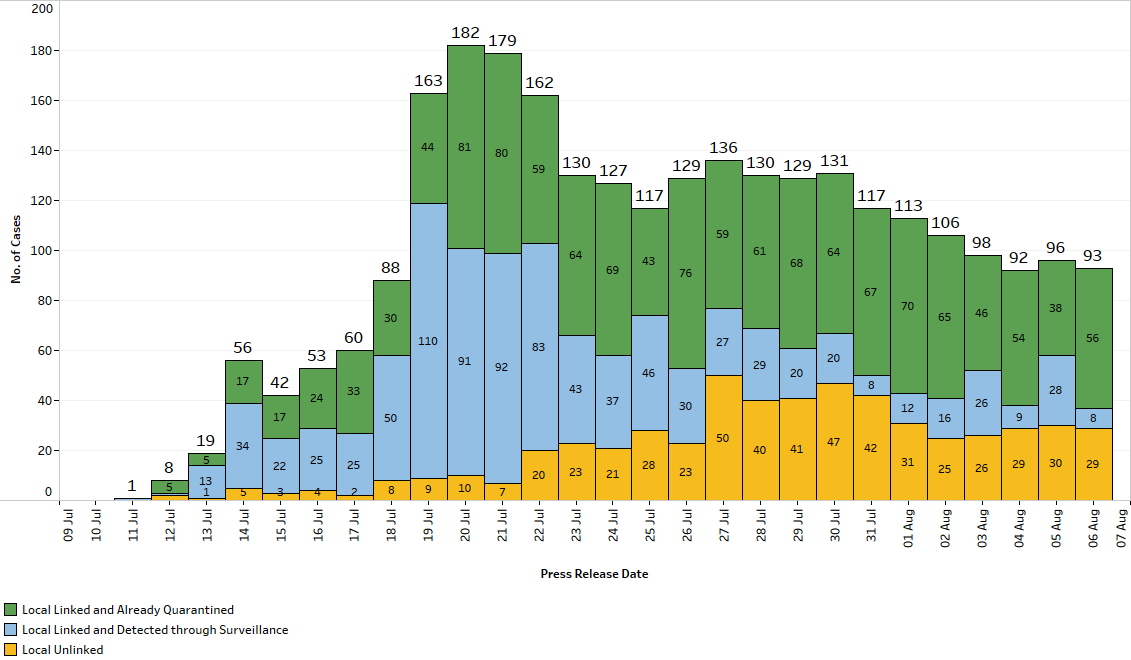
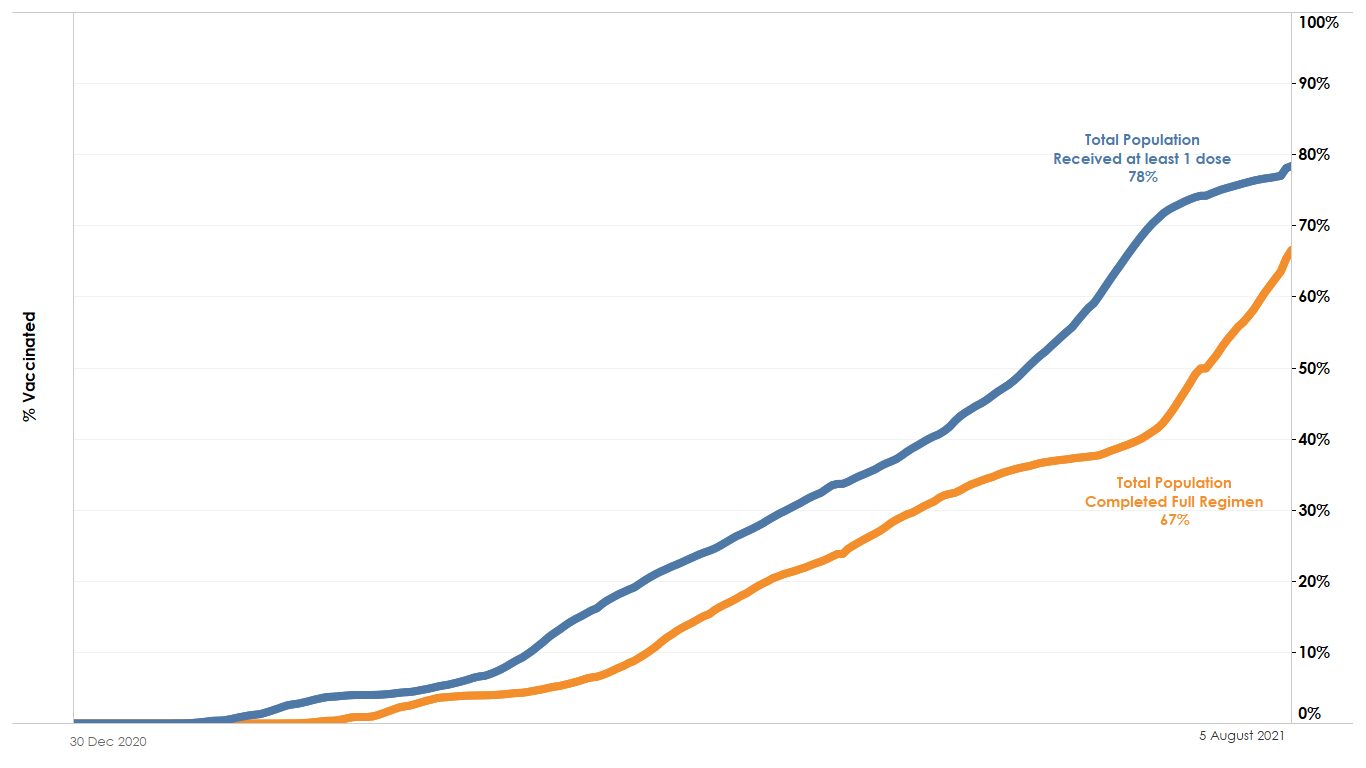
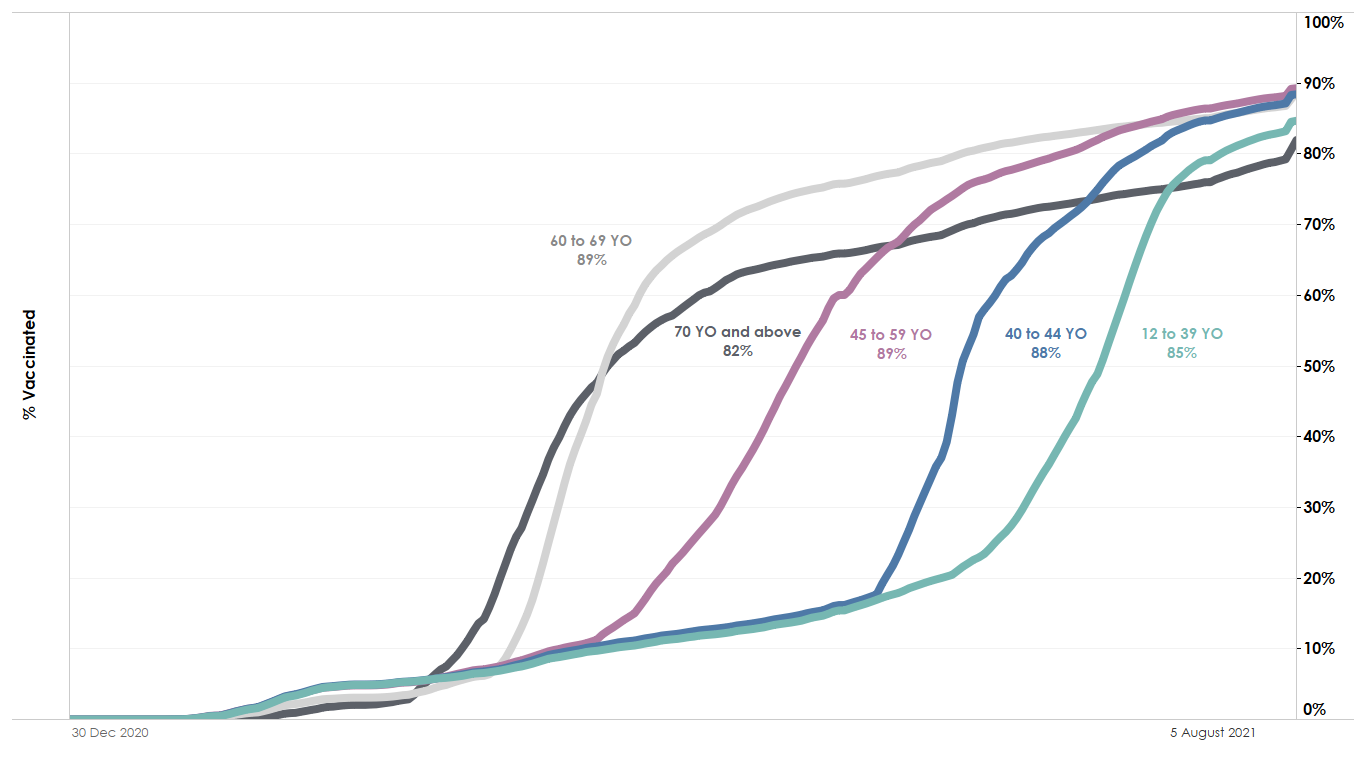
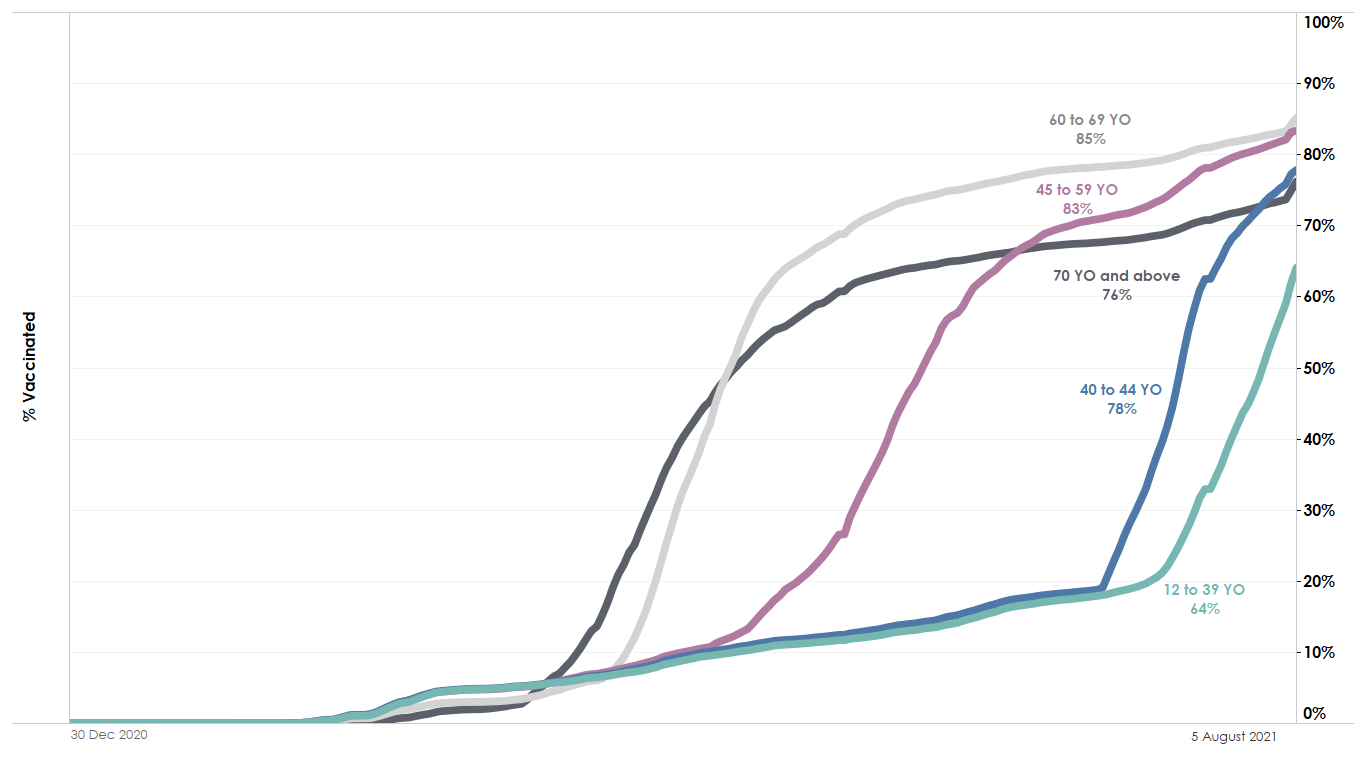
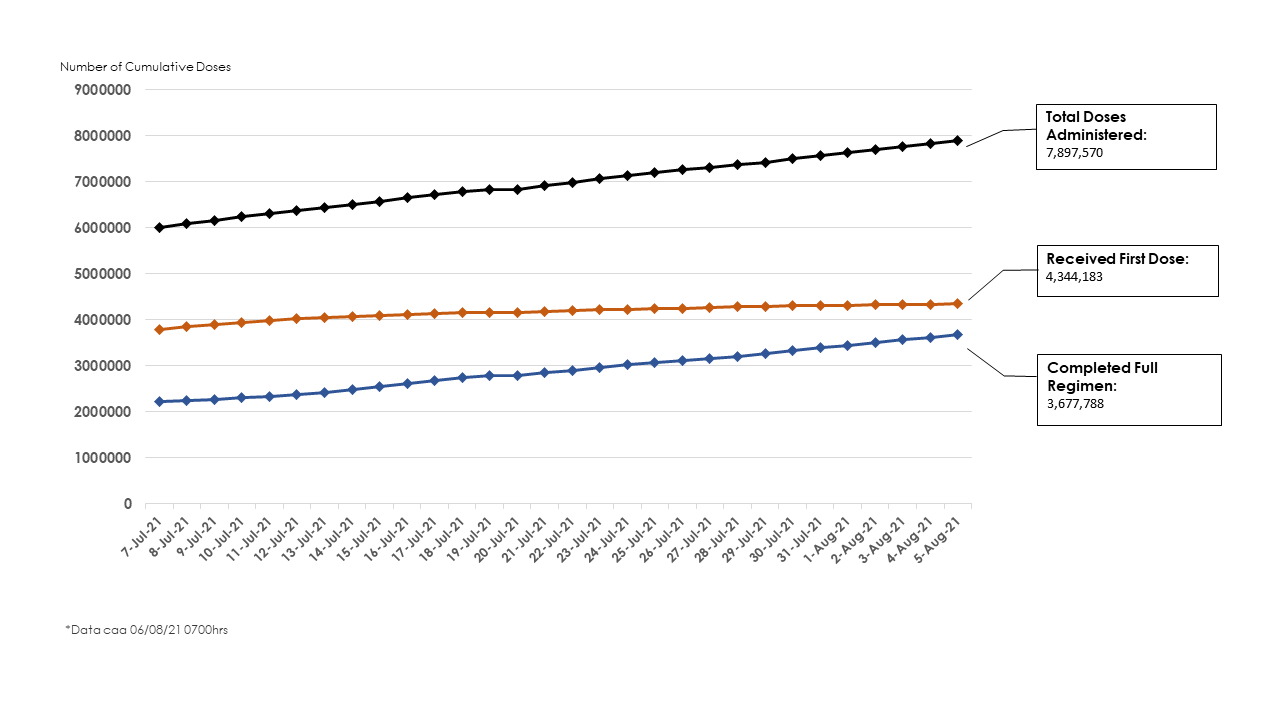
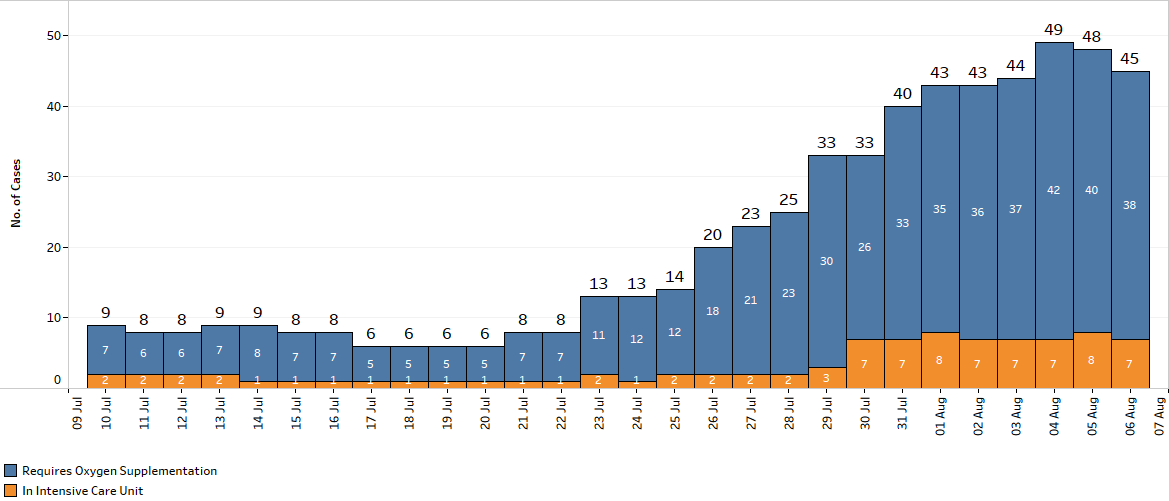
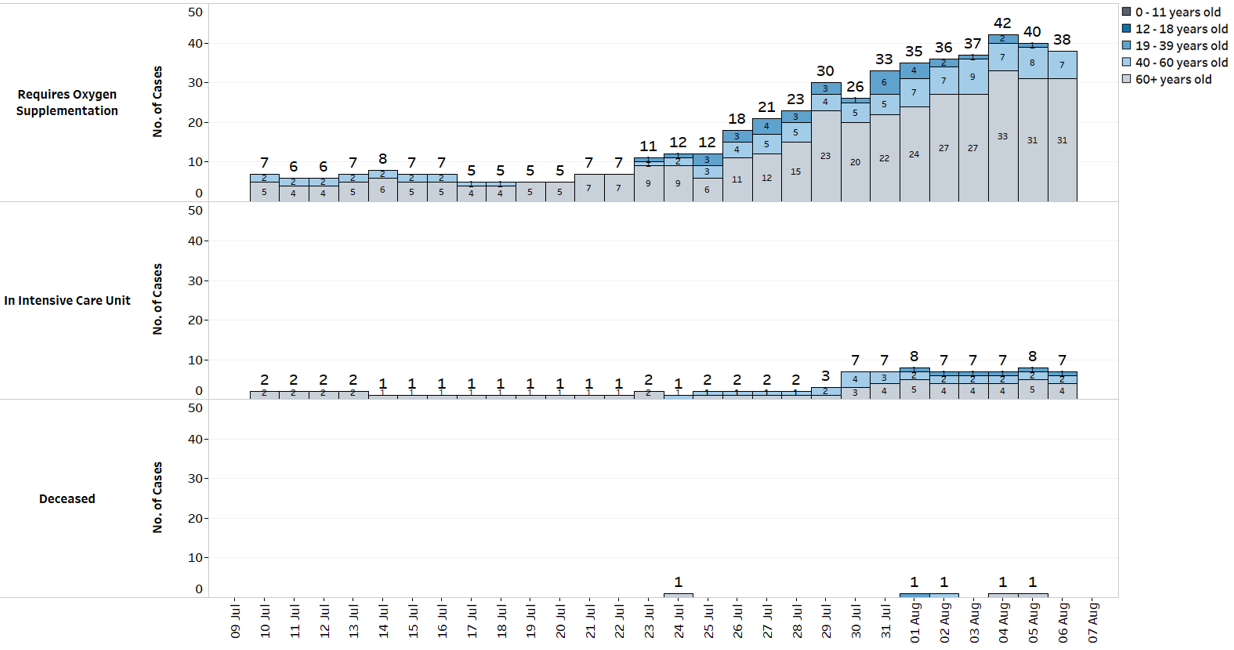
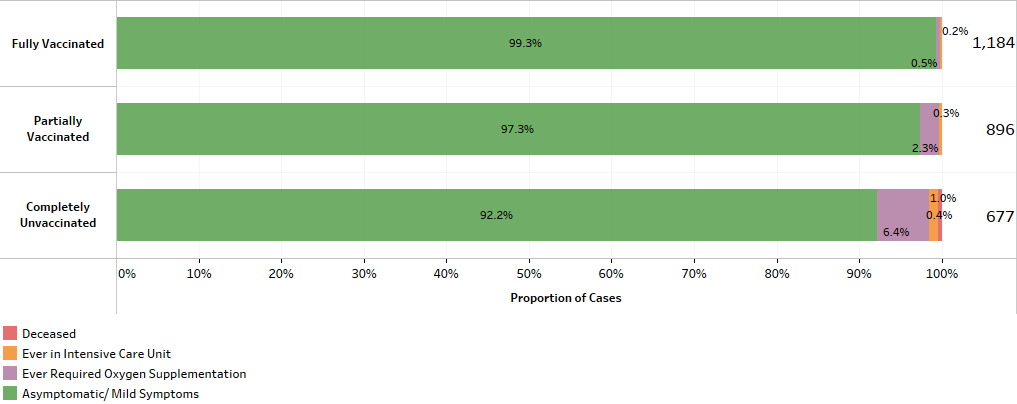
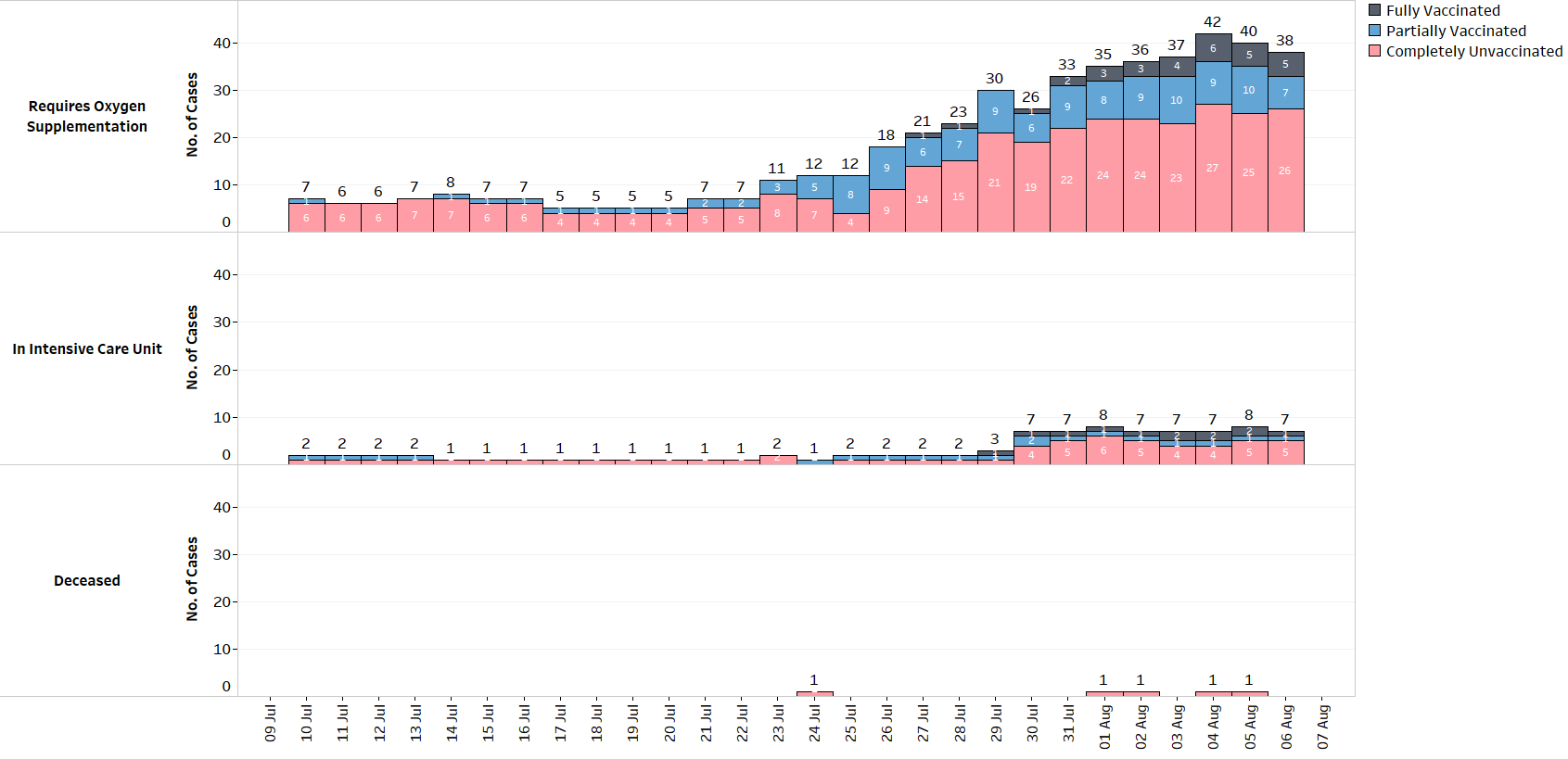
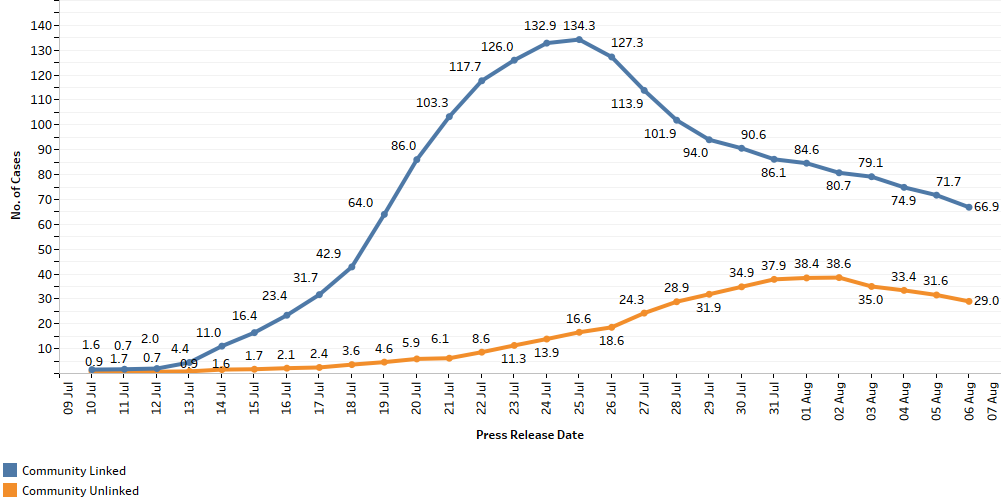
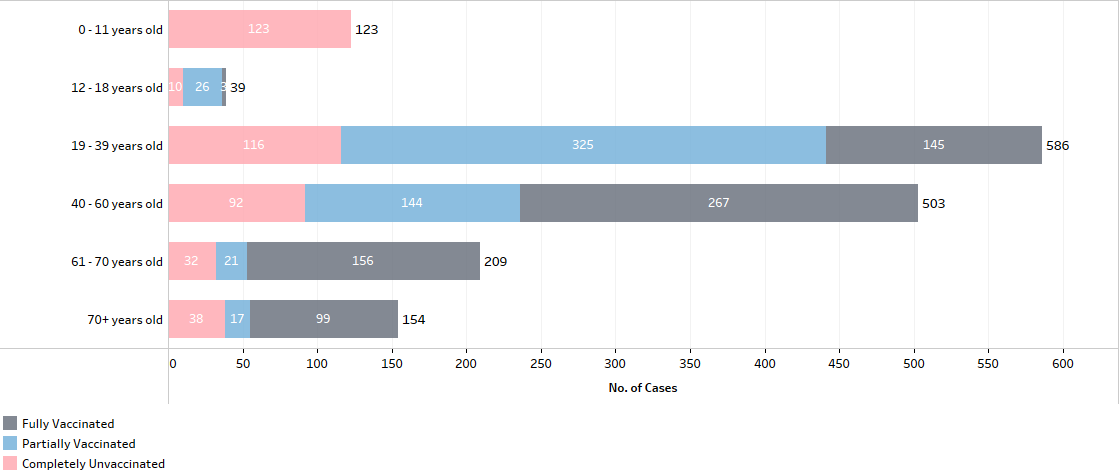
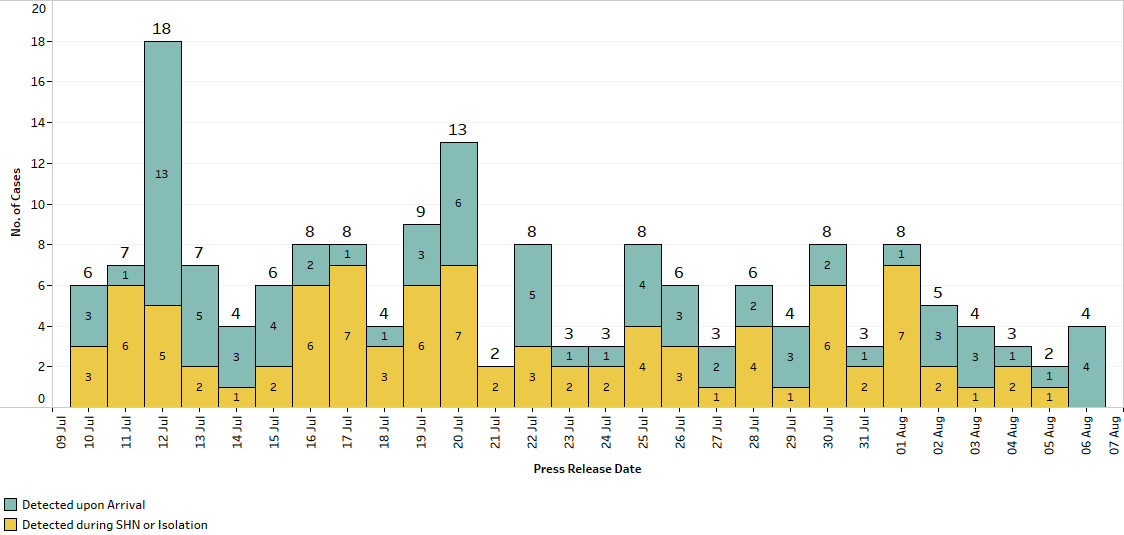
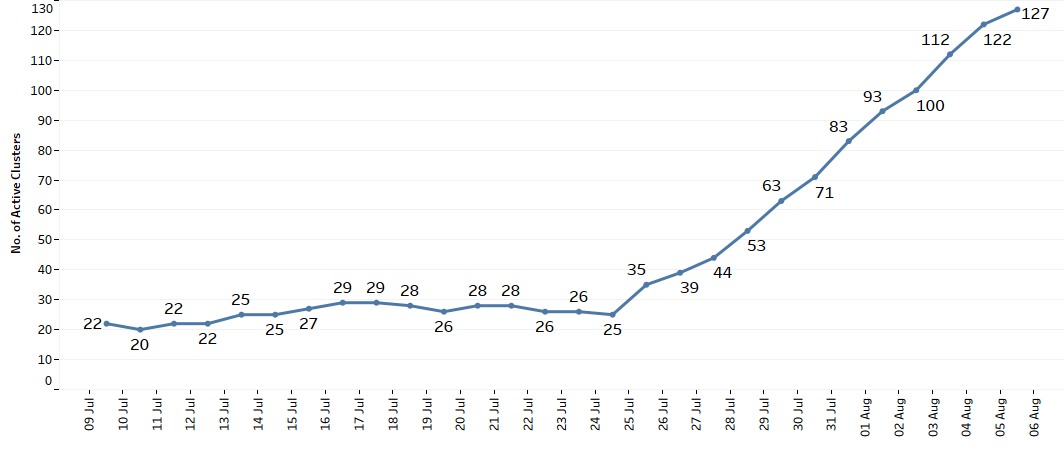
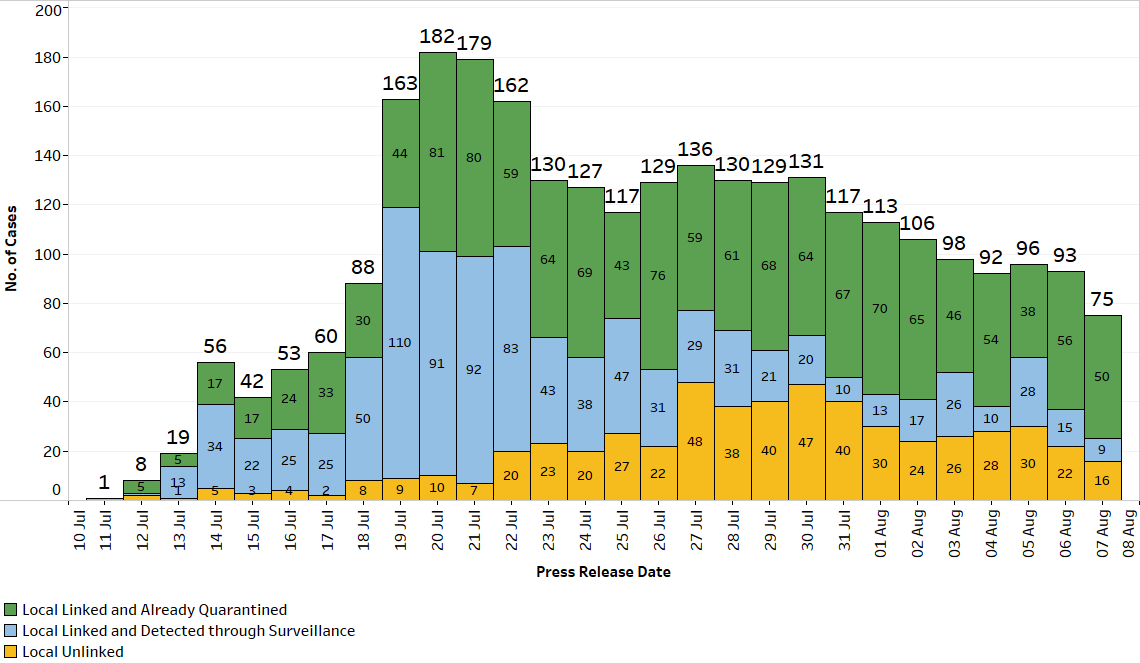
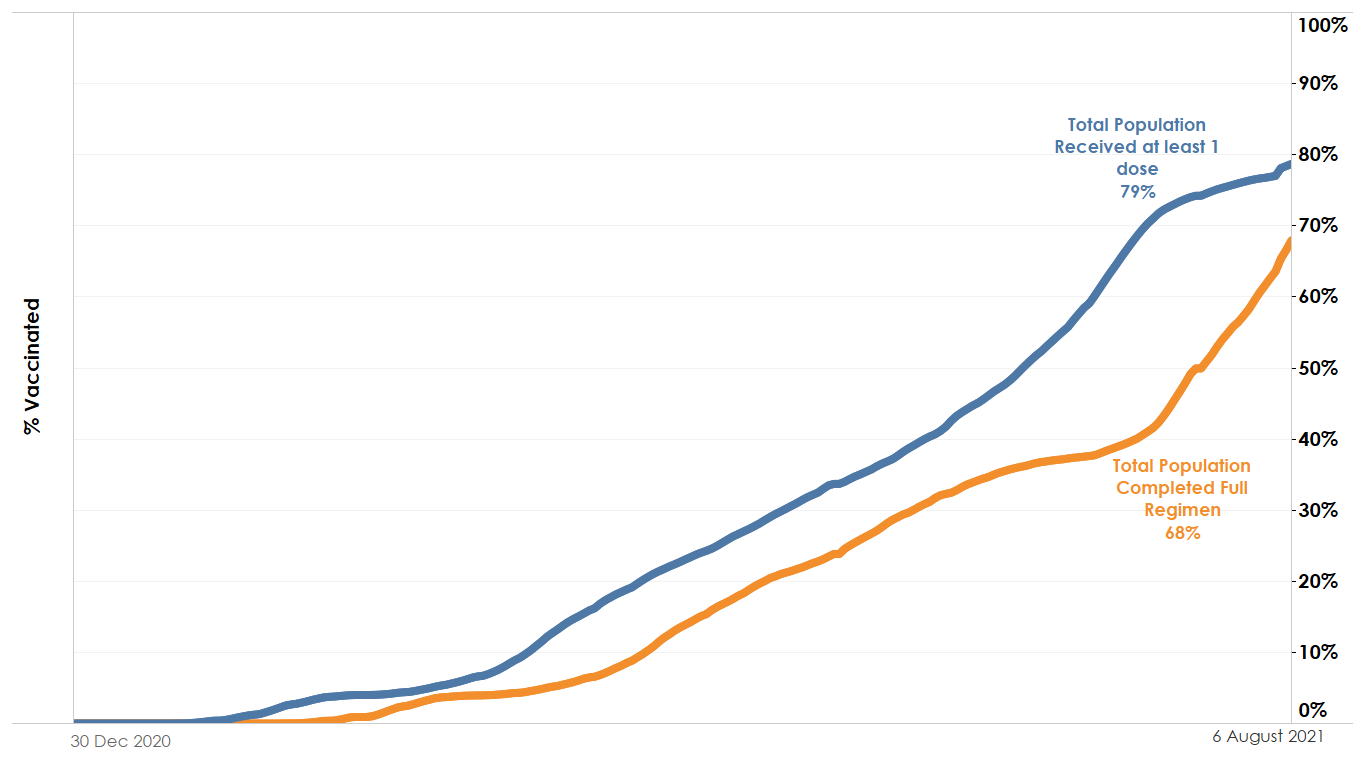
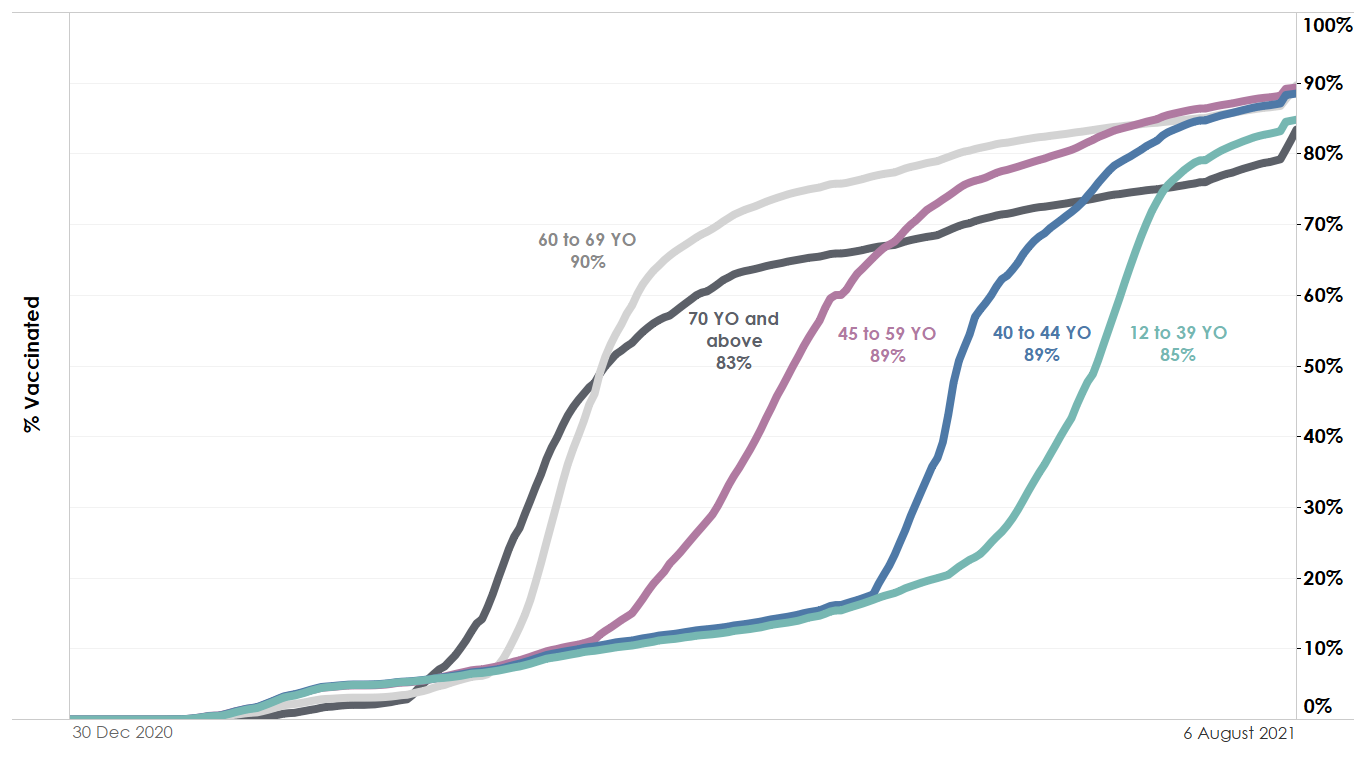
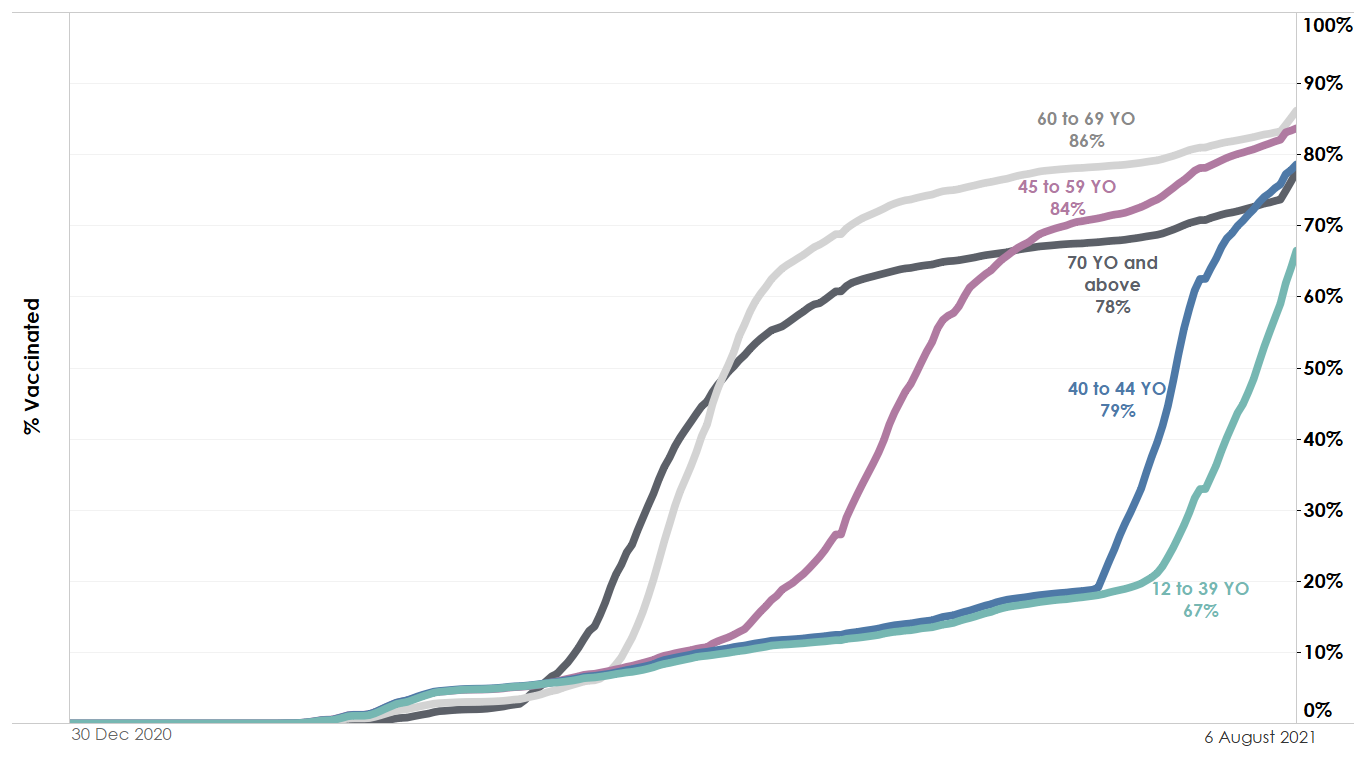
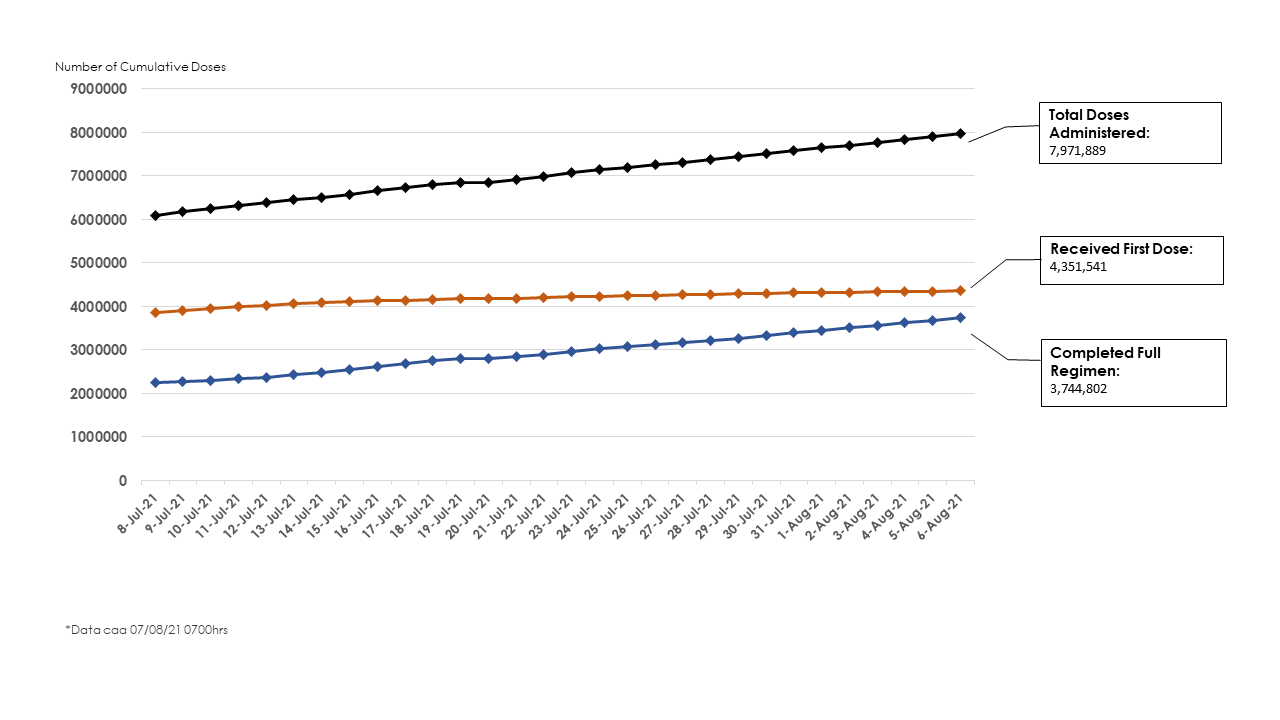
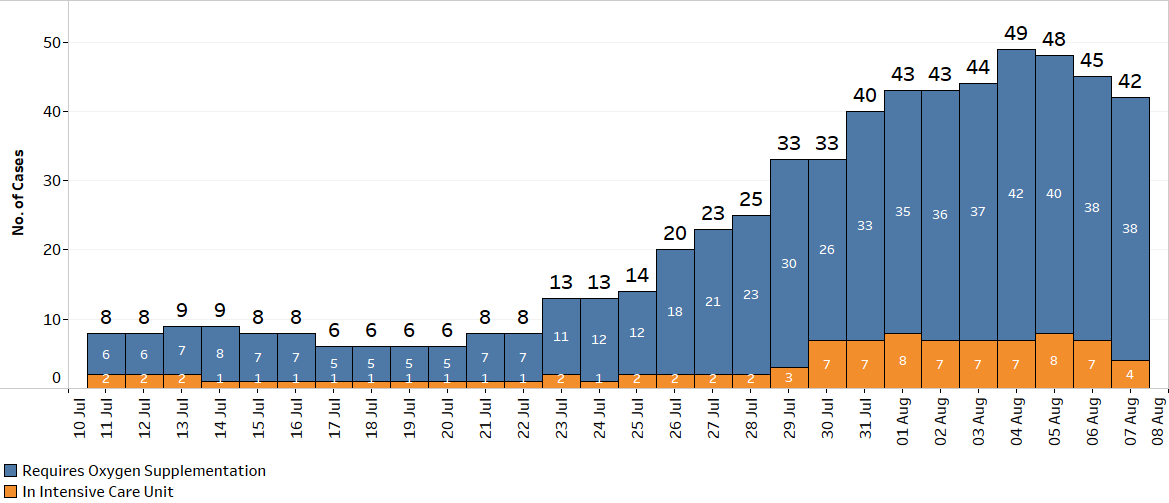
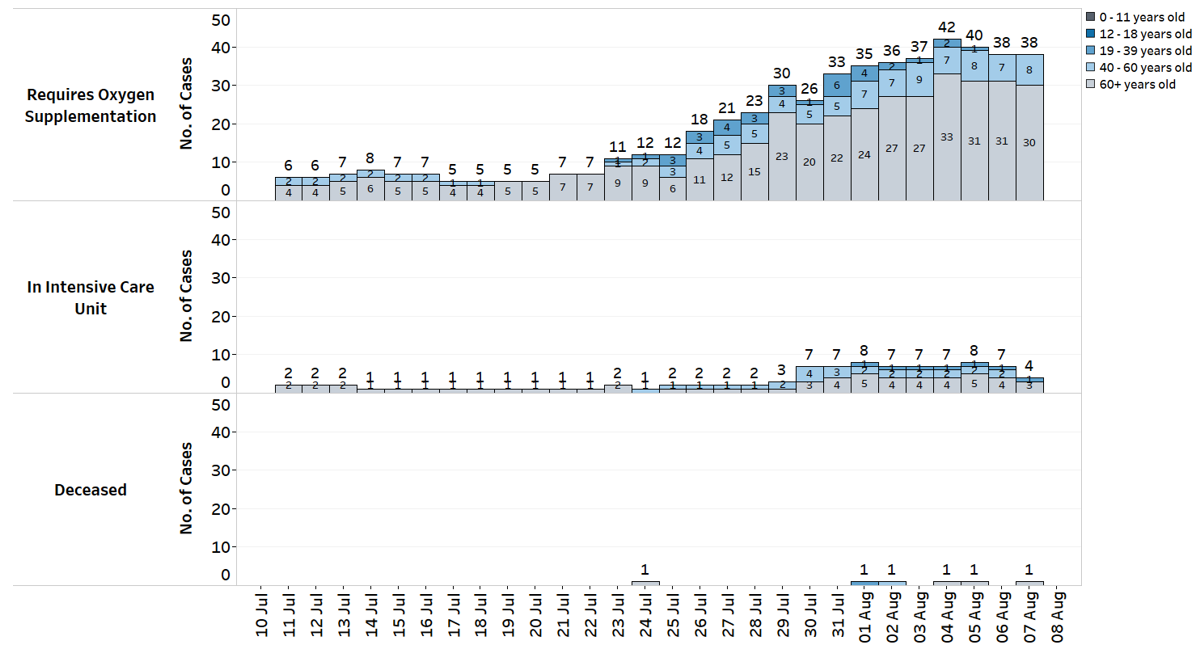
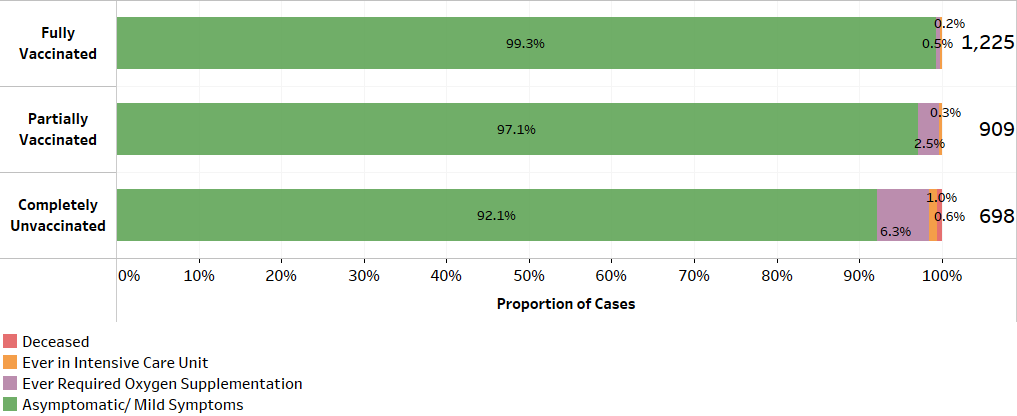
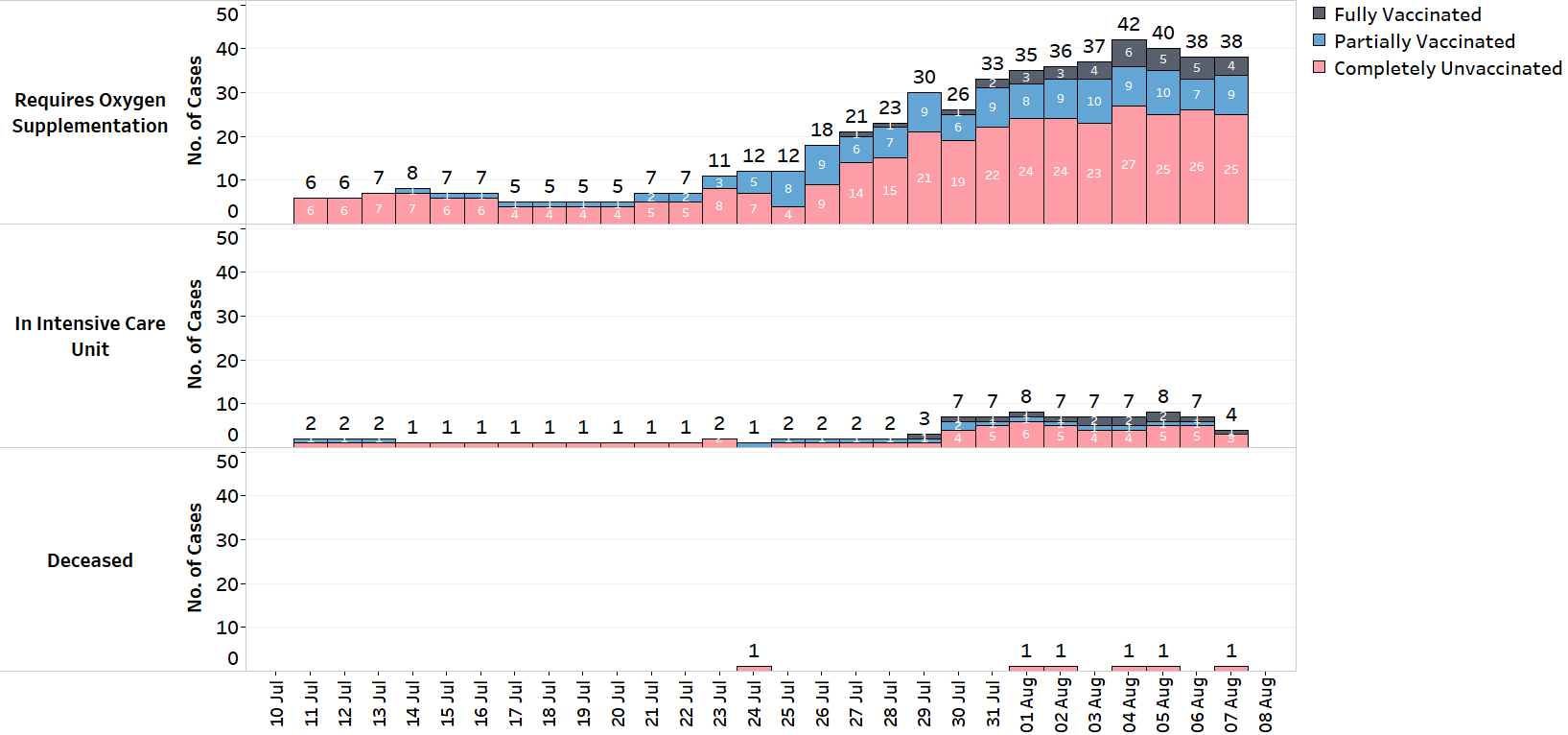
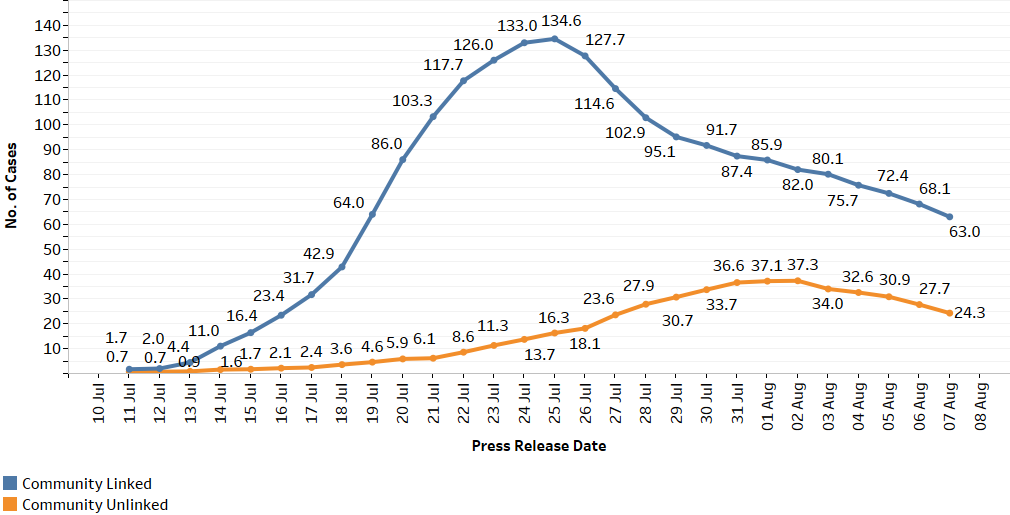
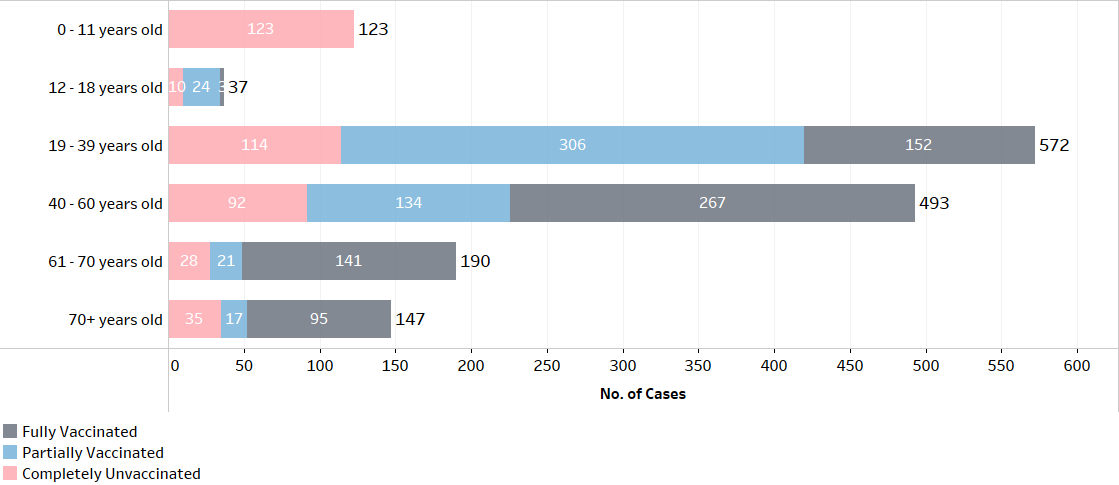
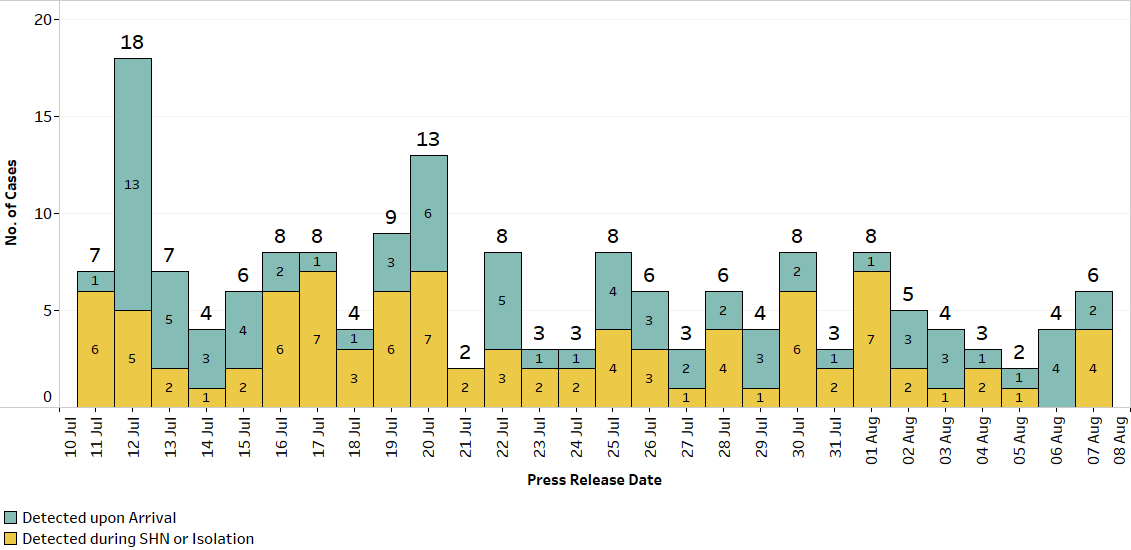
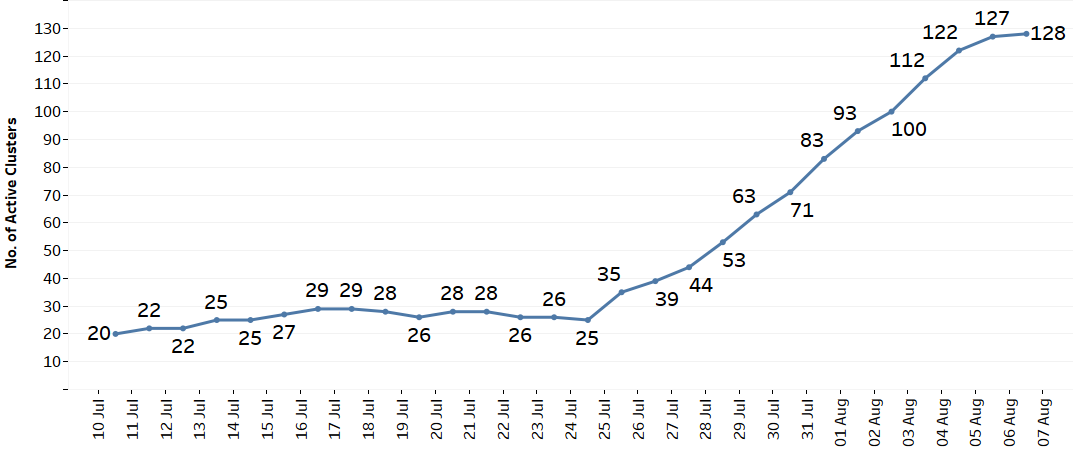
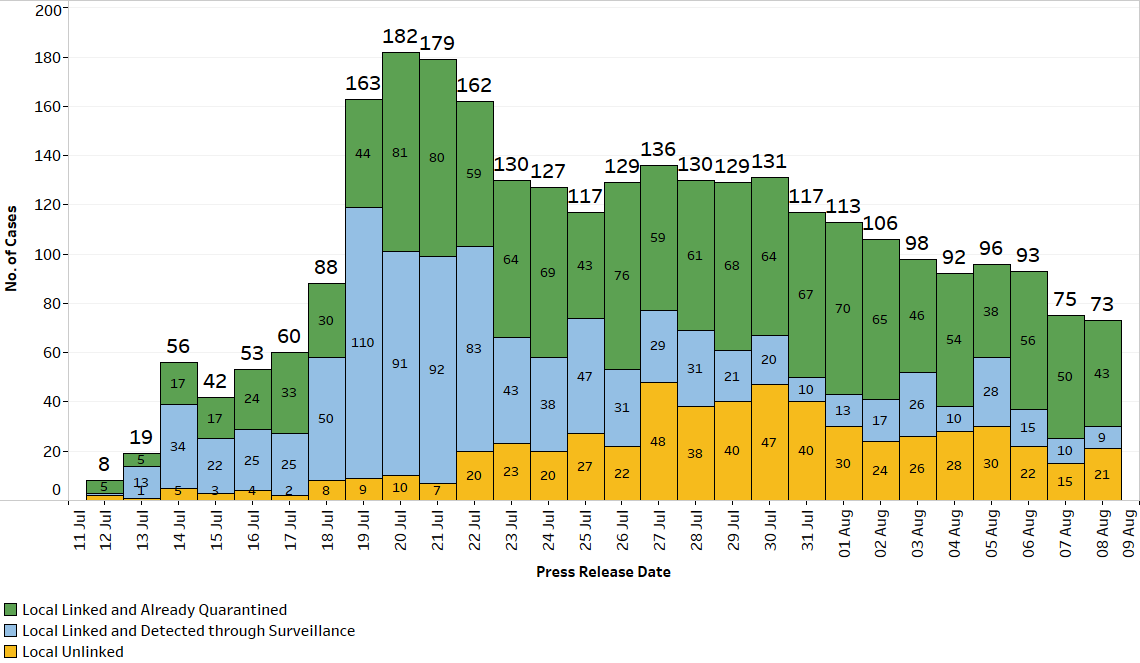
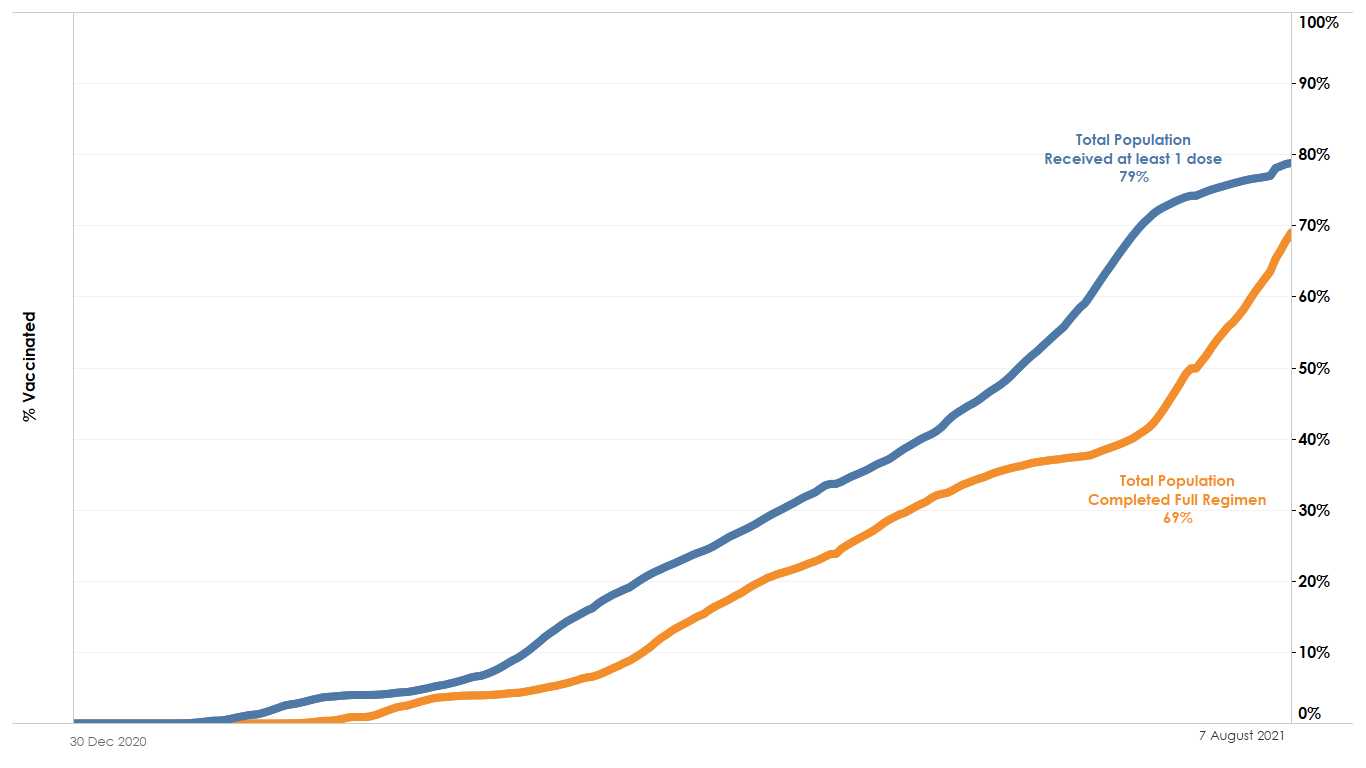
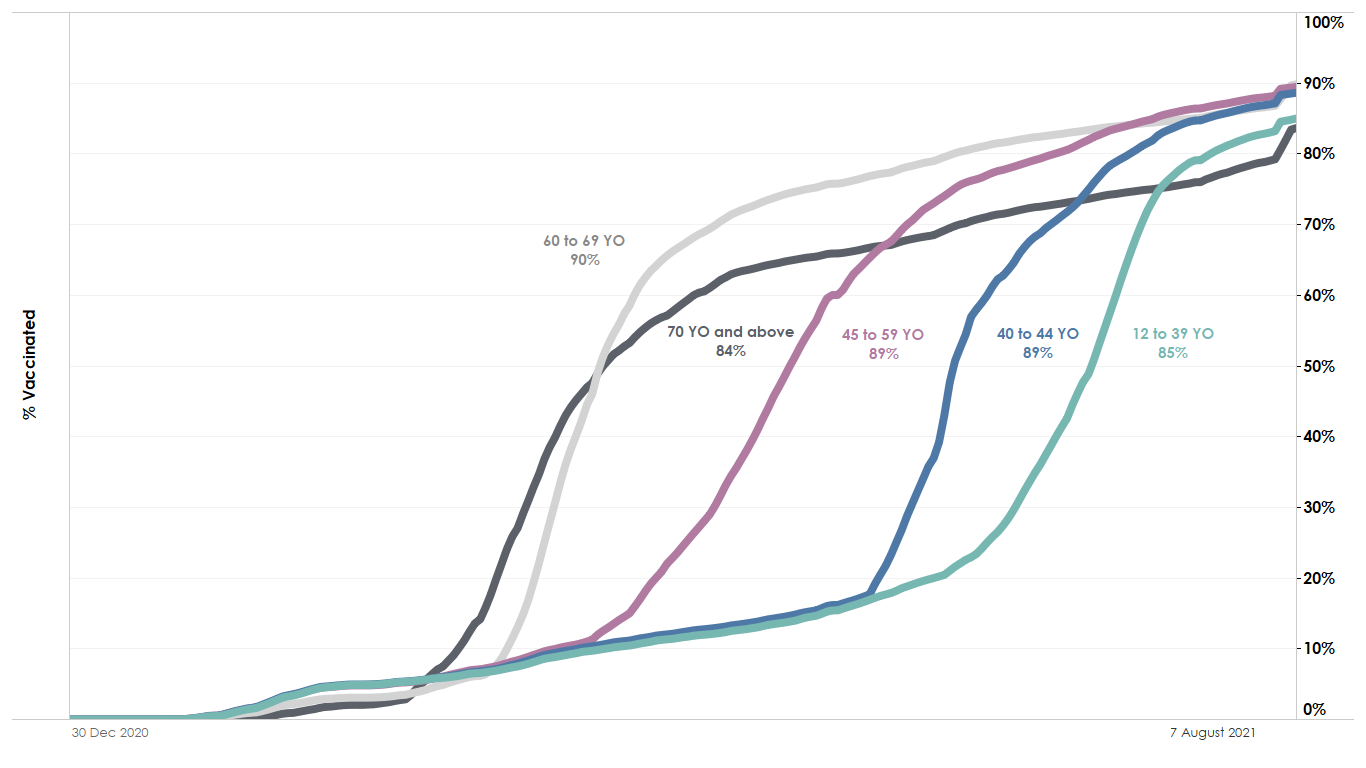
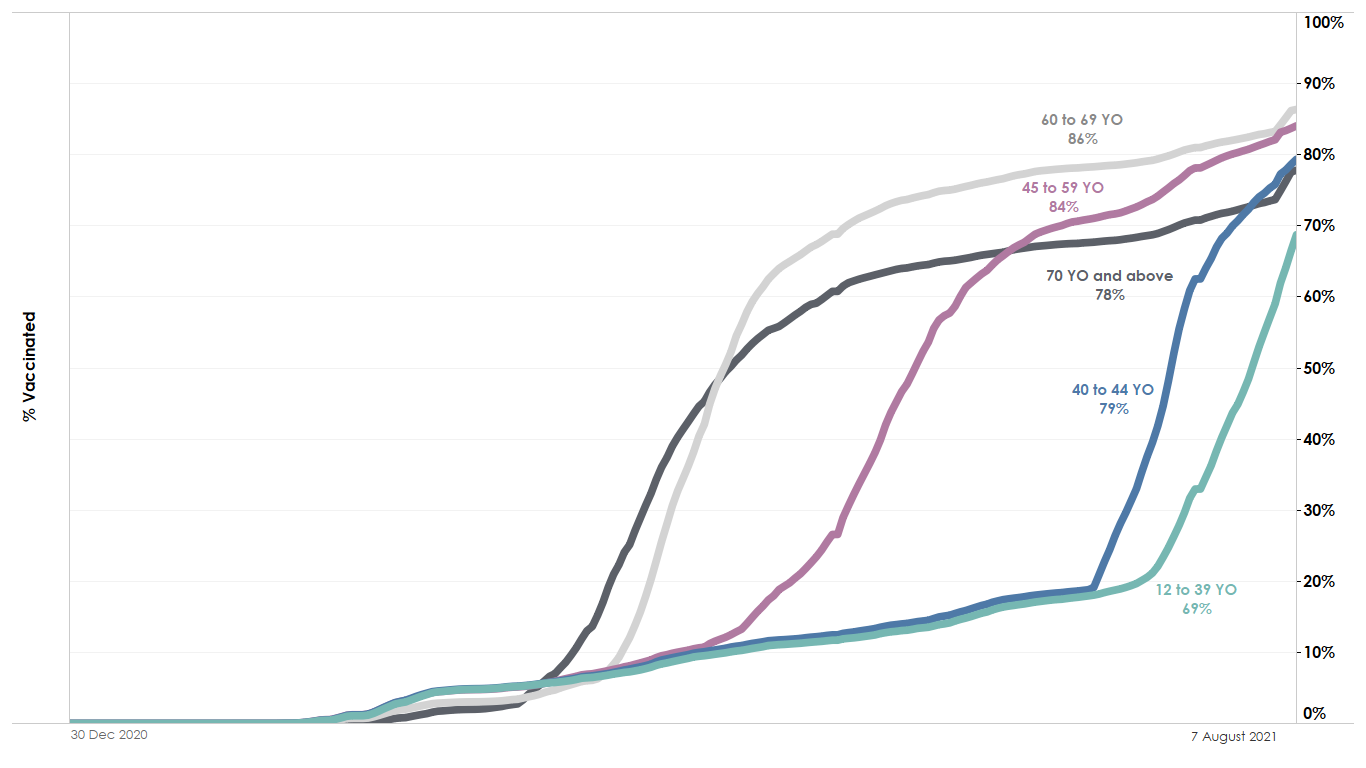
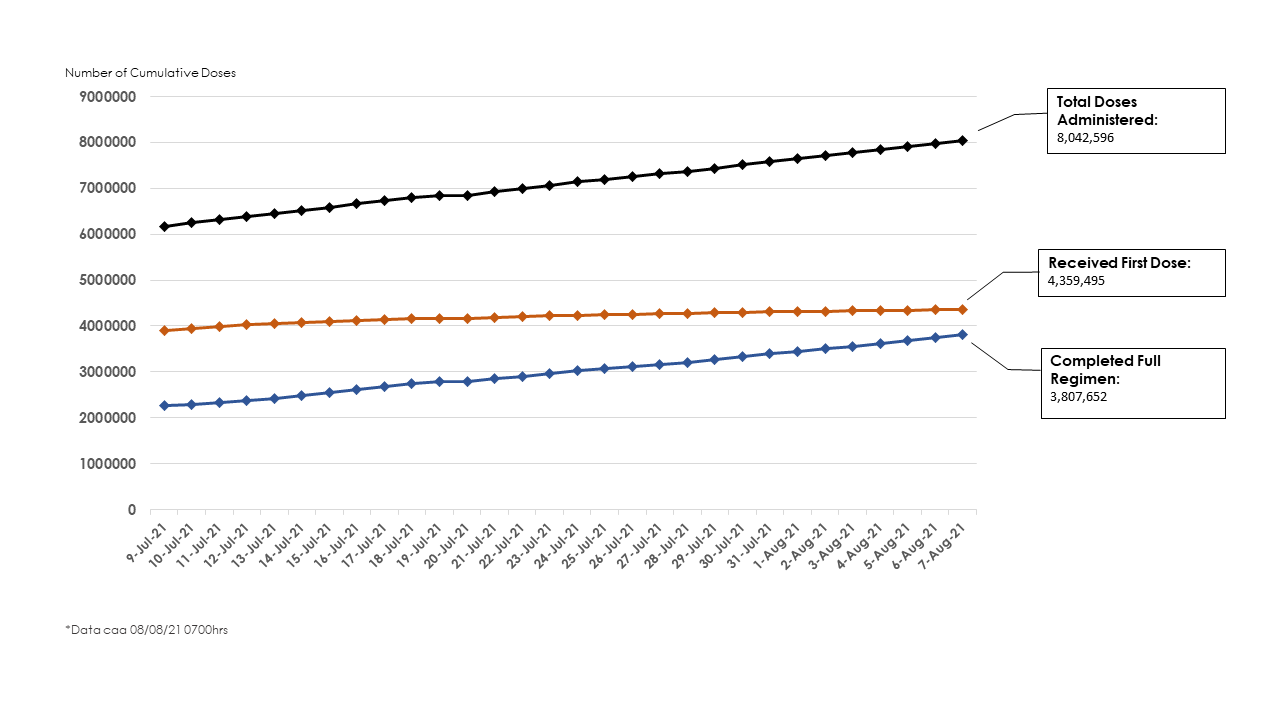
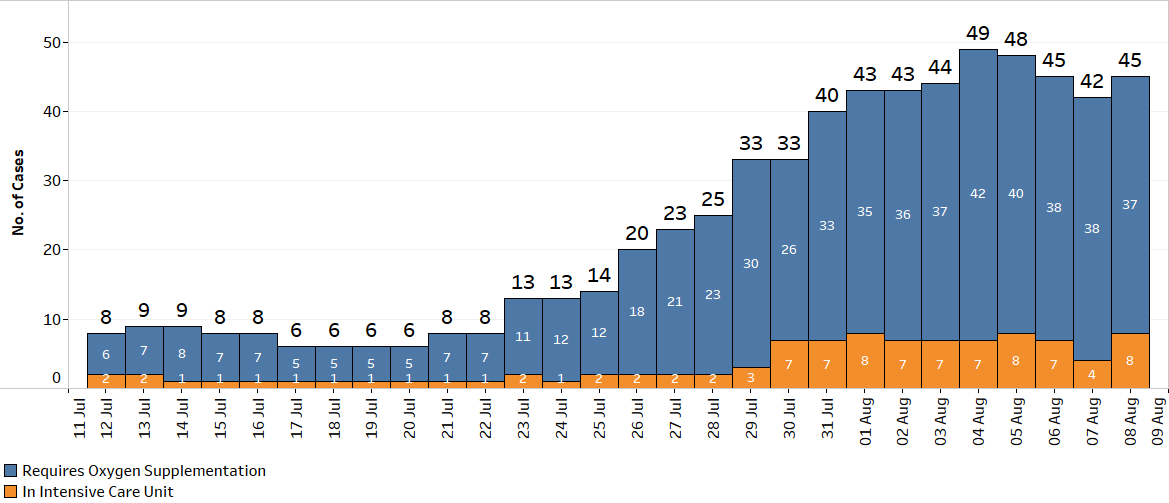
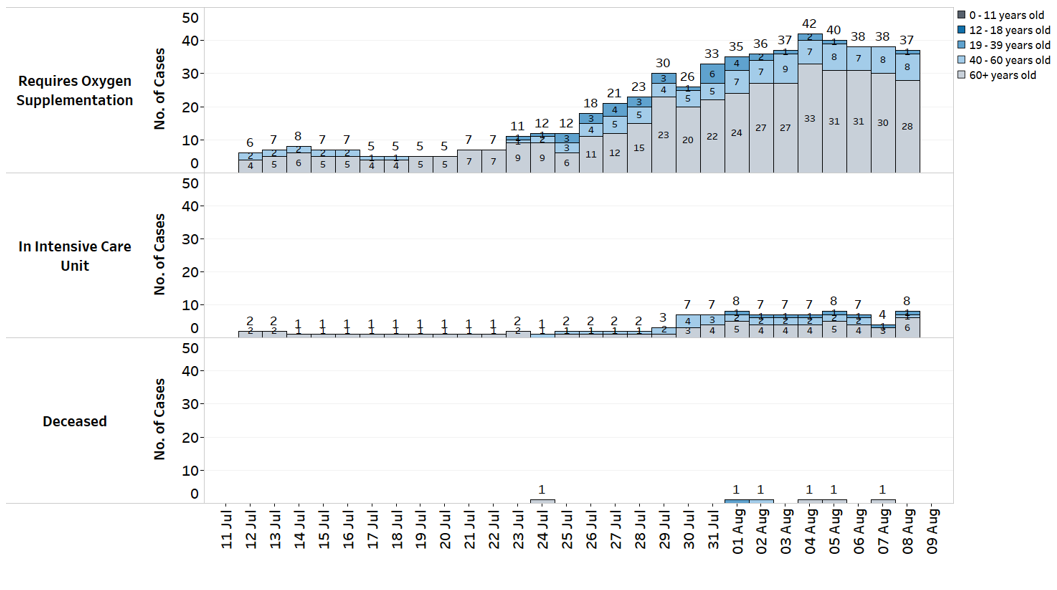
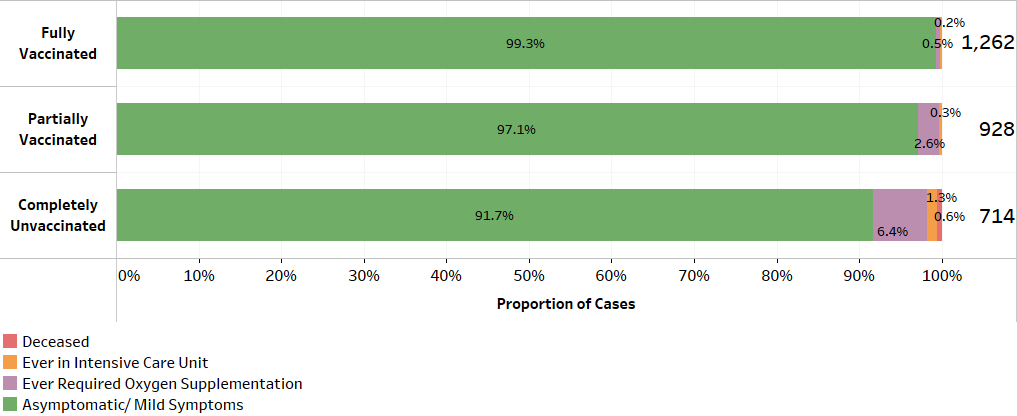
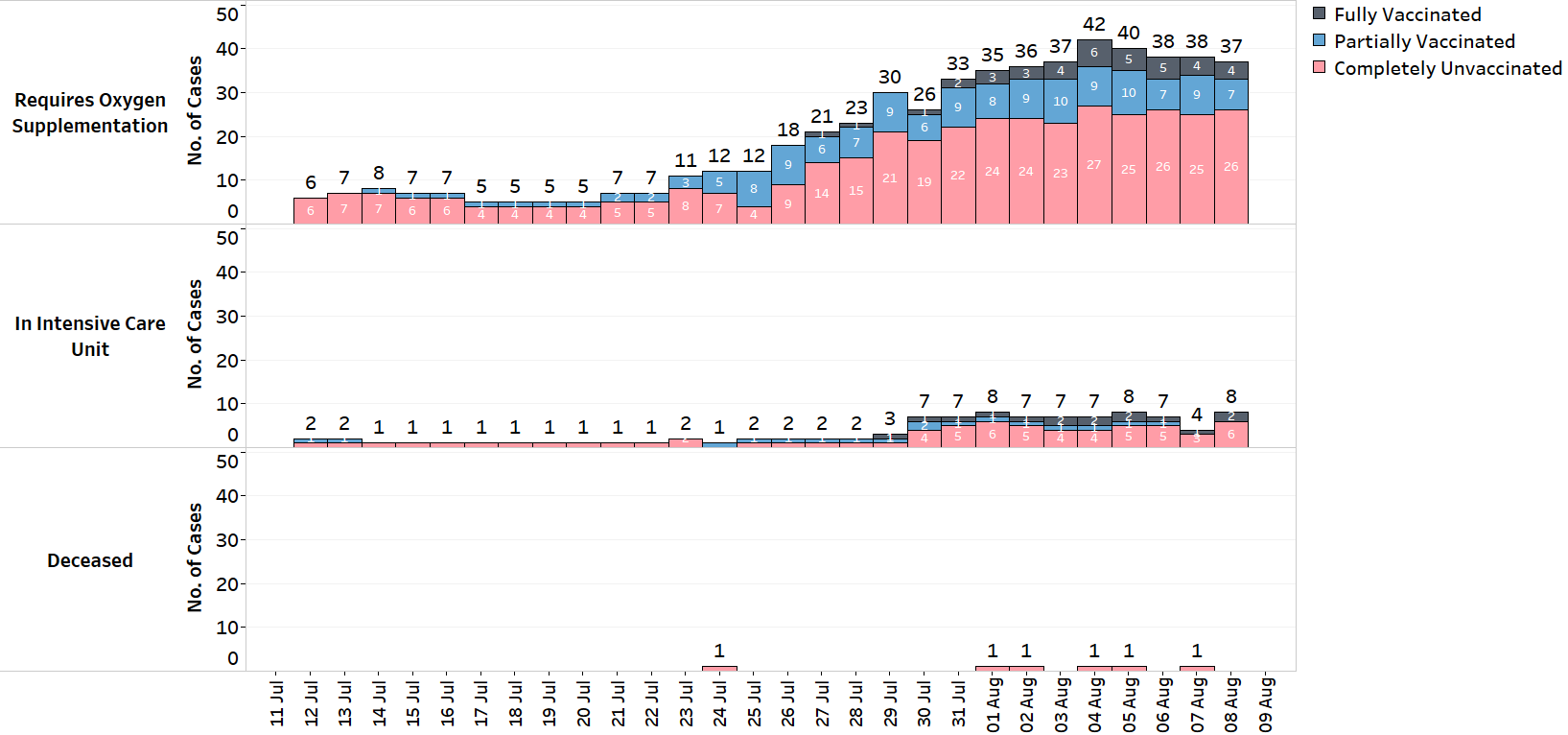
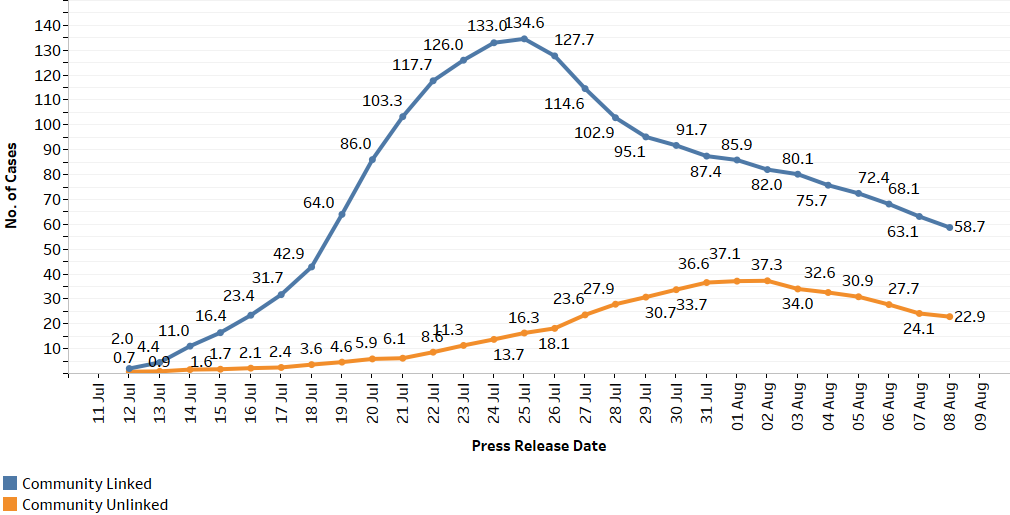
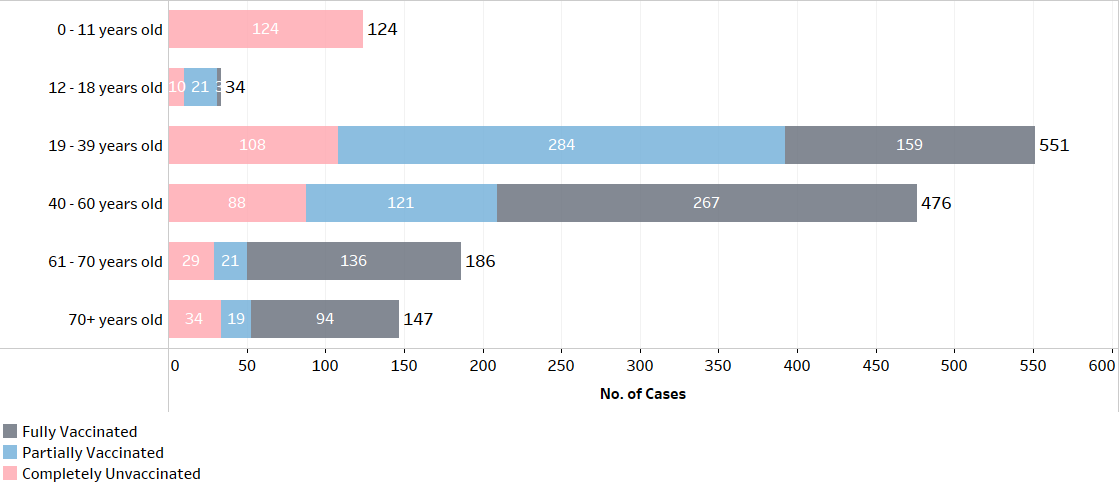
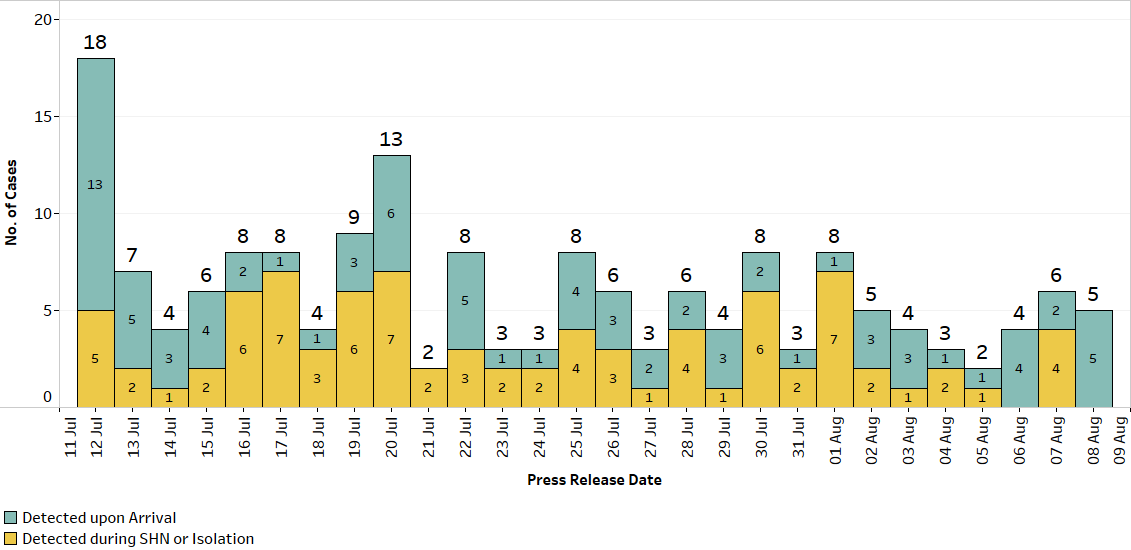
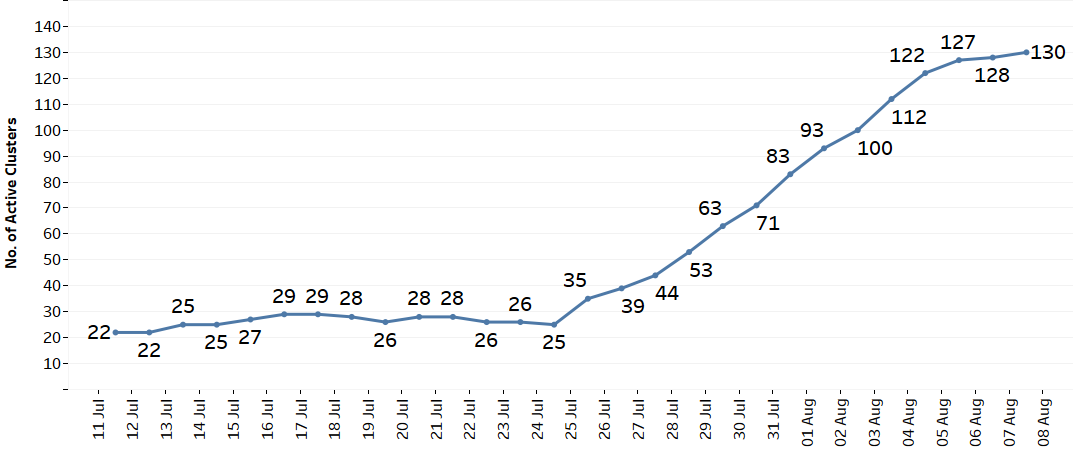
/fig-1-(9-aug).jpg?sfvrsn=40813af9_0)
/fig-2-(9-aug).png?sfvrsn=1eddb31c_0)
/fig-3-(9-aug).png?sfvrsn=7e37a44c_0)
/fig-4-(9-aug).png?sfvrsn=de8cb3f2_0)
/fig-5-(9-aug).jpg?sfvrsn=e93b966b_0)
/fig-6-(9-aug).jpg?sfvrsn=32a325c5_0)
/fig-7-(9-aug).jpg?sfvrsn=1af83262_0)
/fig-8-(9-aug).jpg?sfvrsn=1417630d_0)
/fig-9-(9-aug).jpg?sfvrsn=cc0f6f84_0)
/fig-10-(9-aug).jpg?sfvrsn=6898e8b9_0)
/fig-11-(9-aug).jpg?sfvrsn=6433d073_0)
/fig-12-(9-aug).jpg?sfvrsn=e9edc89_0)
/fig-13-(9-aug).jpg?sfvrsn=2efea015_0)
/fig1(10aug21).png?sfvrsn=8a0d4ef_0)
/fig2(10aug21).png?sfvrsn=b2bf0956_0)
/fig3(10aug21).png?sfvrsn=4e92afde_0)
/fig4(10aug21).png?sfvrsn=e69ac7a2_0)
/fig5(10aug21).png?sfvrsn=ebbfc0c_0)
/fig6(10aug21).png?sfvrsn=5c3d2f74_0)
/fig7(10aug21).png?sfvrsn=fcce9ee9_0)
/fig8(10aug21).png?sfvrsn=eafef6e9_0)
/fig9(10aug21).png?sfvrsn=371935ee_0)
/fig10(10aug21).png?sfvrsn=e6123c78_0)
/fig11(10aug21).png?sfvrsn=243a20f1_0)
/fig12(10aug21).png?sfvrsn=963f0d33_0)
/fig13(10aug21).png?sfvrsn=d58492c3_0)
/210811-figure-1.png?sfvrsn=31fd092a_0)
/210811-figure-2.png?sfvrsn=cfe83101_0)
/210811-figure-3.png?sfvrsn=f7d90f2f_0)
/210811-figure-4.png?sfvrsn=fc7faa2f_0)
/210811-figure-5.png?sfvrsn=25fa9da3_0)
/210811-figure-6.png?sfvrsn=90f25fe5_0)
/210811-figure-7.png?sfvrsn=97010104_0)
/210811-figure-8.png?sfvrsn=543a73d1_0)